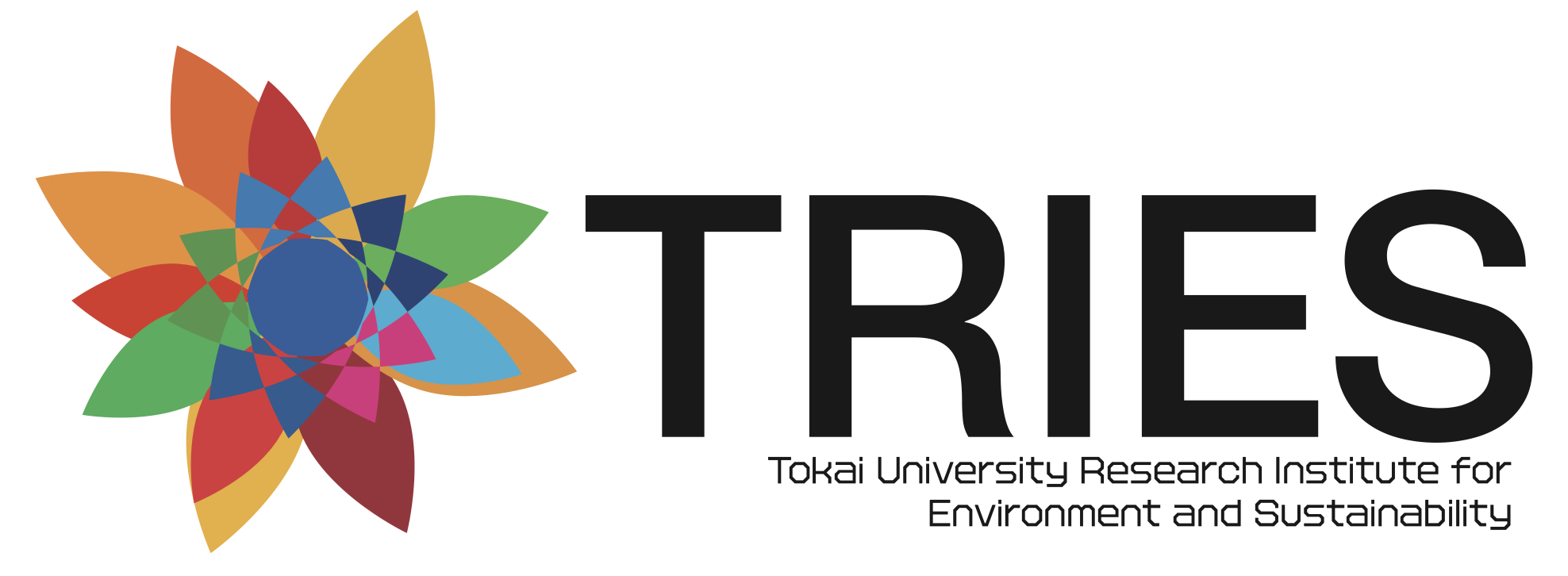Publications
2026
- Qing L., Shen P., Ma X., and Taghizadeh-Hesary (2026). Government Audit Digitalization and Corporate Energy Efficiency for Climate Mitigation, International Review of Economics & Finance, 104994, https://doi.org/10.1016/j.iref.2026.104994
- Jia Y., Zhao C., and Taghizadeh-Hesary F. (2026). Green finance as a catalyst for urban net-zero energy transitions, Journal of Environmental Management, 398, 128386, https://doi.org/10.1016/j.jenvman.2025.128386
- Lu S., Bai X., and Taghizadeh-Hesary F., (2026). Integrated optimization of the water-energy-food nexus for sustainable energy production, Energy Strategy Reviews, 63, 101994, https://doi.org/10.1016/j.esr.2025.101994
- Wang H., Huang G., and Taghizadeh-Hesary F. (2026). Environmental taxation, supply chain dynamics, and corporate ESG performance, Journal of Environmental Management, 397,128304, https://doi.org/10.1016/j.jenvman.2025.128304
2025
- Ayako Wakano, and Hiroyuki Yamada, “The Impact of Terminating Universal Primary Education on Fertility: Evidence from Kenya”International Journal of Educational Development, Vol.117, September 2025, 103361 https://doi.org/10.1016/j.ijedudev.2025.103361
- Kosaka, M.(2025) “Pioneering small and medium sized enterprises’ engagement in sustainability policy in Japan: Toward a new role in policymaking.” Environmental Development, vol.58. https://doi.org/10.1016/j.envdev.2025.101394
- Nishi, H., & Okuma, K. (2025). A Kaleckian growth model with public capital and debt accumulation. Metroeconomica, 76(2), 311-339. https://doi.org/10.1111/meca.12485
- Liu Y., Taghizadeh-Hesary F., and Phoumin H. (2025). Green investment and digital innovation for a low-carbon energy transition, Sustainable Futures, 10, 101481, https://doi.org/10.1016/j.sftr.2025.101481
- Honma S., Ushifusa Y., Taghizadeh-Hesary F., and Vandercamme L. (2025). How do energy efficiency and renewable energy impact carbon emissions in Asian economies? Energy Strategy Reviews, 62, 101993, https://doi.org/10.1016/j.esr.2025.101993
- Xu S., Zhao X., and Taghizadeh-Hesary F. (2025). Towards the environmental sustainability path: the role of fintech, renewable energy consumption, and climate policy uncertainty, Energy Policy, 207, 114841, https://doi.org/10.1016/j.enpol.2025.114841
- Yoshino N., and Taghizadeh-Hesary F. (2025). Introduction: Economic Policies for Accelerating Green Growth in Small and Medium-sized Enterprises. Singapore Economic Review. 70 (8): 2205-2210. https://doi.org/10.1142/S0217590825030055
- Thaker HBMT., Lacheheb Z., Lelchumanan B., Duasa J., Taghizadeh-Hesary F. (2025). Examining factors influencing chatbot adoption in Takaful industry: Malaysian evidence". International Journal of Islamic and Middle Eastern Finance and Management, https://doi.org/10.1108/IMEFM-01-2025-0056
- Shan J., Pei L., Lu S., and Taghizadeh-Hesary F. (2025). An evolutionary game model of energy transition and carbon reduction governance: The role of public welfare lawsuits, Energy Strategy Reviews, 62, 101911, https://doi.org/10.1016/j.esr.2025.101911
- Rasoulinezhad, E., Taghizadeh-Hesary, F. (2025). Assessing the role of education in promoting green growth in urban areas. Discover Sustainability 6, 867 https://doi.org/10.1007/s43621-025-01836-z
- Honma S., Ushifusa Y., Taghizadeh-Hesary F., Okamura S., and Vandercamme L. (2025). Environmental efficiency of Japanese regions before and after the Great East Japan Earthquake, Sustainable Futures, 10, 101047, https://doi.org/10.1016/j.sftr.2025.101047
- Taghizadeh-Hesary, F., Khan, M.K., Xu, B. et al. (2025). Editor’s introduction to the special issue on green digital finance and energy transition, and FinTech and market analysis. Financial Innovation, 11, 112, https://doi.org/10.1186/s40854-025-00782-z
- Taghizadeh-Hesary, F., Rasoulinezhad, E. Accelerating the renewable energy transition in the EU: the role of smart technologies and ESG investments. Discover Sustainability 6, 692 (2025). https://doi.org/10.1007/s43621-025-01476-3
- Amin, S.B., Taghizadeh-Hesary, F., Ayshi, F.A. et al. (2025). Examining tourism-induced environmental Kuznets Curves in South Asia. Discover Sustainability 6, 250. https://doi.org/10.1007/s43621-025-00974-8
- Taghizadeh-Hesary F., and Zhao X. (2025). Does Executive Green Cognition Drive Corporate Green Development? Singapore Economic Review. https://doi.org/10.1142/S0217590825490049
- Ma X., Wen Z., Li W., Taghizadeh-Hesary F., (2025). Enhancing energy conservation and carbon emission reduction synergies through digital technology: Firm-level evidence from China, Energy Reports, 13: 3686-3699, https://doi.org/10.1016/j.egyr.2025.03.018
- Taghizadeh-Hesary F. and Rasoulinezhad E. (2025). Impact of renewable energy expansion on government debt in developing countries, Energy Strategy Reviews, 58, 101684, https://doi.org/10.1016/j.esr.2025.101684
- Liu Y., Zhao C., Kong Z., Taghizadeh-Hesary F., (2025). Pathways to stable economic policy: The role of industrial robotics and energy transition, Renewable Energy, 244, 122751, https://doi.org/10.1016/j.renene.2025.122751.
- Li, X., Yan, M., Ren, X., & Taghizadeh-Hesary, F. (2025). Can government procurement improve capacity utilization in enterprises? Evidence from China. Applied Economics, 1–18. https://doi.org/10.1080/00036846.2025.2464824
- Jia Y., Liu Y. and Taghizadeh-Hesary F., (2025). The nexus among geopolitical risk, metal prices, and global supply chain pressure: Evidence from the TVP-SV-VAR approach, Economic Analysis and Policy, https://doi.org/10.1016/j.eap.2025.02.003.
- Qian X., Wang Y., Pan M., Gatto A., Taghizadeh-Hesary F., and Zhao X. (2025). Does e-commerce development reduce carbon emissions? Empirical analysis based on spatial Durbin difference-in-difference model, Computers & Industrial Engineering, 110954, https://doi.org/10.1016/j.cie.2025.110954.
- Hosen, M., Mohd Thas Thaker, H., Uddin, M.N., Qoyum, A. and Taghizadeh-Hesary, F. (2025). Do Islamic cryptocurrency and Bitcoin co-move at different investment horizons?. International Journal of Islamic and Middle Eastern Finance and Management, https://doi.org/10.1108/IMEFM-03-2024-0153
- Yadav, M.P., Kushwah, S.V., Taghizadeh-Hesary, F. and Mishra, N. (2025), Unveiling the dynamic linkages between energy, forex and financial markets amidst natural and man-made outbreaks, Review of Accounting and Finance, 24(1): 129-151. https://doi.org/10.1108/RAF-03-2024-0086
- Taghizadeh-Hesary F., and Zhao X. (2025). Does Executive Green Cognition Drive Corporate Green Development? Singapore Economic Review. https://doi.org/10.1142/S0217590825490049
- Sun, X., Rui, X., Cui, Z., Taghizadeh-Hesary, F., and Zhao X. (2025). Unleashing the green potential: exploring the dynamic influence of the urban digital economy on carbon emissions. Financial Innovation, 11, 39 (2025). https://doi.org/10.1186/s40854-024-00739-8
- Zhao C., Ding J., Taghizadeh-Hesary F. and Sun H. (2025). Bilateral cooperation or complete autonomy? Research on the trade-in of NEV battery using a differential game with delay effect, Energy for Sustainable Development, 85, 101644, https://doi.org/10.1016/j.esd.2024.101644
- Farhad Taghizadeh-Hesary, Hassanudin Mohd Thas Thaker, M. Ishaq Bhatti, and Mohamed Asmy Mohd Thas Thaker (Editors). Islamic Finance and Sustainability: A Research Companion Book (2025). London: Routledge; https://doi.org/10.4324/9781003518617
- Ying R.Y.T., Ahammed S., Hosen M., Thaker H.M.T & Taghizadeh-Hesary, F. (2025). Impact of Corporate Sustainability on Financial Performance: Insights from Malaysian Green Banks. In: Farhad Taghizadeh-Hesary, Hassanudin Mohd Thas Thaker, M. Ishaq Bhatti, Mohamed Asmy Mohd Thas Thaker (eds.). Islamic Finance and Sustainability: A Research Companion. Routledge: London
- Taghizadeh-Hesary et al. (2025). Introductory Remarks. In: Farhad Taghizadeh-Hesary, Hassanudin Mohd Thas Thaker, M. Ishaq Bhatti, Mohamed Asmy Mohd Thas Thaker (eds.) Islamic Finance and Sustainability: A Research Companion. Routledge: London
- Nomura, K., Yamamoto, M. (2025) "Plastic reduction and firm characteristics: Evidence from (non-) financial information in Japan," Environmental Economics and Policy Studies.https://doi.org/10.1007/s10018-025-00438-3
- Cui Y., Wu W., and Taghizadeh-Hesary F., (2025). Assessing the economic impact of carbon pricing on single and childless households: A case of 28 European countries, Sustainable Futures, 100927, https://doi.org/10.1016/j.sftr.2025.100927
- Zhao, X., He, Y., Lee, H., Ma, X., Taghizadeh-Hesary, F., Yang, Z.: In the Context of China’s Mineral Resource Scarcity: How Does Digitalization Promote Low-carbon Transformation of Corporate Energy? Politická ekonomie, 2025, 73 (5), https://doi.org/10.18267/j.polek.1476
- Ding, Y., Chin, L., Taghizadeh-Hesary, F., & Yan, X. (2025). Does government digitization contribute to economic growth? Empirical evidence from 109 countries. Technological and Economic Development of Economy, 1-21. https://doi.org/10.3846/tede.2025.24060
- Amin S.B. Khandaker M.K., Samia B.I. Khan F., and Taghizadeh-Hesary F. (2025). Fostering sustainable tourism through digital innovation and green tourism initiatives in Bangladesh, Sustainable Futures, 10, 100841, https://doi.org/10.1016/j.sftr.2025.100841
- Li, J., Zhao, T., and Taghizadeh-Hesary, F. (2025). Impact of EU corporate sustainability reporting directive on financial performance: evidence from companies. Journal of Risk Finance, https://doi.org/10.1108/JRF-01-2025-0008
- Ren, X., Liang, R., Cheng, X. and Taghizadeh-Hesary, F. (2025). Tax Credit Rating Disclosure and Stock Price Crash Risk: Evidence from China. Review of Accounting and Finance, https://doi.org/10.1108/RAF-02-2025-0055
- Taghizadeh-Hesary F. (2025). The impact of artificial intelligence adoption and financial accessibility on energy sustainability, Energy Strategy Reviews, 59, 101744, https://doi.org/10.1016/j.esr.2025.101744.
- Zhao X., Zhao J., Taghizadeh-Hesary F., (2025). Is energy system resilience improved in the energy transition? Evidence from China, Energy Economics, 146, 108485, https://doi.org/10.1016/j.eneco.2025.108485
- Amin, S.B., Taghizadeh-Hesary, F., Khan, F. et al. (2025). Reviving the green transition process in the post-pandemic Era: the case of Bangladesh. Environmental Economics and Policy Studies (2025). https://doi.org/10.1007/s10018-025-00446-3
- Chen F., Luo K., Taghizadeh-Hesary F., (2025). How does upstream service liberalization benefit downstream manufacturing firms’ emissions reduction performance? Energy Economics, 145, 108449, https://doi.org/10.1016/j.eneco.2025.108449.
- Ren, X., Zhang, Z., Cao, Y., Taghizadeh-Hesary, F. (2025) Unleashing potential: how climate policy uncertainty impacts digital transformation in China’s listed companies. Discover Sustainability 6, 255. https://doi.org/10.1007/s43621-025-01031-0
- Lou, W., Lu, S., Li, M., Taghizadeh-Hesary F., (2025). Determinants of green energy investment—financial drivers and equitable transition. Humanities and Social Sciences Communications, vol 12, 489, https://doi.org/10.1057/s41599-025-04760-9
- Energy Security, Transition, and Economic Growth. Editors: Farhad Taghizadeh-Hesary, Youngho Chang, and Naoyuki Yoshino. Singapore: The World Scientific
- The Role of Green and Transition Finance in Achieving Carbon Neutrality and Sustainable Energy. Editors: Suk Hyun, Farhad Taghizadeh-Hesary, Inhyung Lee, Bing Xu. Amsterdam: Elsevier
- Sustainable Growth and Green Policies: Navigating Energy and Environmental Challenges. (2025). Editors: Farhad Taghizadeh-Hesary, Naoyuki Yoshino, Nawazish Mirza, and Muhammad Mohsin. Singapore: The World Scientific
- Rasoulinezhad E., and Taghizadeh-Hesary F., (2025). Green Finance for Energy Efficiency, Sustainable Transition, and Emission Reduction: Insights from the Top 10 Green Finance-Supporting Countries. In: Farhad Taghizadeh-Hesary, Youngho Chang, and Naoyuki Yoshino (eds.). Energy Security, Transition, and Economic Growth. Singapore: The World Scientific. https://doi.org/10.1142/9789819812608_0006
- Taghizadeh-Hesary F., Rasoulinezhad E., Yoshino N., Chang Y., Taghizadeh-Hesary F., and Morgan P. J. (2025). Energy Security, Pollution, and Health in Selected Developing Asian Economies. In: Farhad Taghizadeh-Hesary, Youngho Chang, and Naoyuki Yoshino (eds.). Energy Security, Transition, and Economic Growth. Singapore: The World Scientific. https://doi.org/10.1142/9789819812608_0005
- Rahmani A. Bonyadi Naeni A., Taghizadeh-Hesary F., and Aboojafari R. (2025). Enhancing Energy Security in Agriculture: Drivers of Solar Water Pump Adoption in Developing Economies. In: Farhad Taghizadeh-Hesary, Youngho Chang, and Naoyuki Yoshino (eds.). Energy Security, Transition, and Economic Growth. Singapore: The World Scientific. https://doi.org/10.1142/9789819812608_0004
- Amin S.B., Taghizadeh-Hesary F., Kabir F.A., Khan F., and Vandercamme L. (2025). Energy Security and Growth: Linking Energy Intensity with Capital Efficiency in South Asia. In: Farhad Taghizadeh-Hesary, Youngho Chang, and Naoyuki Yoshino (eds.). Energy Security, Transition, and Economic Growth. Singapore: The World Scientific. https://doi.org/10.1142/9789819812608_0002
- Taghizadeh-Hesary F., Rasoulinezhad E., Phoumin H., and Vandercamme L. (2025). Advancing Access to Renewable Energy in Southeast Asia to Enhance Energy Security. In: Farhad Taghizadeh-Hesary, Youngho Chang, and Naoyuki Yoshino (eds.). Energy Security, Transition, and Economic Growth. Singapore: The World Scientific. https://doi.org/10.1142/9789819812608_0001
- Taghizadeh-Hesary F., Chang Y., and Yoshino N. (2025). Front Matters. In: Farhad Taghizadeh-Hesary, Youngho Chang, and Naoyuki Yoshino (eds.). Energy Security, Transition, and Economic Growth. Singapore: The World Scientific. https://doi.org/10.1142/9789819812608_fmatter
- Karim S., Khan S., Mirza N., Alawi S.M., and Taghizadeh-Hesary F. (2025). Climate Finance in the Wake of COVID-19: Connectedness of Clean Energy with Conventional Energy and Regional Stock Markets. In: Farhad Taghizadeh-Hesary, Naoyuki Yoshino, Nawazish Mirza, and Muhammad Mohsin (eds.). Sustainable Growth and Green Policies: Navigating Energy and Environmental Challenges. (2025). Singapore: The World Scientific. https://doi.org/10.1142/9789819812783_0006
- Rahmani A., Bonyadi Naeni A., Taghizadeh-Hesary F., and Aboojafari R. (2025). Behavioral Determinants of Private Investment in Renewable Energy. In: Farhad Taghizadeh-Hesary, Naoyuki Yoshino, Nawazish Mirza, and Muhammad Mohsin (eds.). Sustainable Growth and Green Policies: Navigating Energy and Environmental Challenges. (2025). Singapore: The World Scientific https://doi.org/10.1142/9789819812783_0003
- Yoshino N., Rasoulinezhad E., Phoumin H., Taghizadeh-Hesary F., and Vandercamme L. (2025). Fostering Green Growth in ASEAN by Strengthening SME Contributions to Carbon Neutrality. In: Farhad Taghizadeh-Hesary, Naoyuki Yoshino, Nawazish Mirza, and Muhammad Mohsin (eds.). Sustainable Growth and Green Policies: Navigating Energy and Environmental Challenges. (2025). Singapore: The World Scientific https://doi.org/10.1142/9789819812783_0001
- Taghizadeh-Hesary F., Yoshino N., Mirza N., Mohsin M. (2025). Front Matters. In: Farhad Taghizadeh-Hesary, Naoyuki Yoshino, Nawazish Mirza, and Muhammad Mohsin (eds.). Sustainable Growth and Green Policies: Navigating Energy and Environmental Challenges. (2025). Singapore: The World Scientific https://doi.org/10.1142/9789819812783_fmatter
- Vandercamme L., and Taghizadeh-Hesary F., (2025). Green finance for energy transition, energy poverty alleviation, and energy security. In: Suk Hyun, Farhad Taghizadeh-Hesary, Inhyung Lee, Bing Xu (eds.). The Role of Green and Transition Finance in Achieving Carbon Neutrality and Sustainable Energy, Amsterdam: Elsevier. https://doi.org/10.1016/B978-0-443-24736-1.00012-8
- Hyun S., Taghizadeh-Hesary F., Lee I., and Xu B. (2025). Front Matters. In: Suk Hyun, Farhad Taghizadeh-Hesary, Inhyung Lee, Bing Xu (eds.). The Role of Green and Transition Finance in Achieving Carbon Neutrality and Sustainable Energy, Amsterdam: Elsevier. https://doi.org/10.1016/B978-0-443-24736-1.01001-X
2024
- Wang Z., Cao X., Ren X., and Taghizadeh-Hesary F., (2024) Can digital transformation affect coal utilization efficiency in China? Evidence from spatial econometric analyses, Resources Policy, 91, 104940.
- Le, T.-H., Vo, L.H. and Taghizadeh-Hesary, F. (2024) A study on the nonlinear dynamics of ASEAN financial integration, Journal of Asian Business and Economic Studies, 31(1): 2-14.
- Ren X., Xiao Y., Xiao S., Jin Y., Taghizadeh-Hesary F., (2024) The effect of climate vulnerability on global carbon emissions: Evidence from a spatial convergence perspective, Resources Policy, 90, 104817.
- Dong K., Taghizadeh-Hesary F., and Zhao C. (2024) Climate-Smart City: Can China's Smart City Policy Lead to Low-Carbon Development of Cities? Climate Change Economics.
- Zhao X., Wang Z., Xie Y., Taghizadeh-Hesary F., and Li H. (2024) Regional disparities and dynamic evolution of energy efficiency distribution: Evidence from 2052 Chinese counties, Gondwana Research, 130: 158-168.
- Musibau, H.O., Zakari, A. & Taghizadeh-Hesary, F. (2024) Exploring the Fiscal policy—income inequality relationship with Bayesian model averaging analysis. Economic Change and Restructuring 57, 21.
- Liu Y., Dong K., Wang K., and Taghizadeh-Hesary F. (2024) Moving towards sustainable city: Can China's green finance policy lead to sustainable development of cities? Sustainable Cities and Society, 105242.
- Yang S., Wang J., Dong K. and Taghizadeh-Hesary F. (2024) How Justice is Our Energy Future? Assessing the Impact of Green Finance on Energy Justice in China. Annals of Financial Economics.
- Taghizadeh-Hesary F., Vandercamme L. and Phoumin H. (2024) Enhancing the Economic Feasibility of Carbon Capture, Utilisation, and Storage (CCUS) Projects. Journal of Environmental Assessment Policy and Management. 26(1).
- Liu Y., Dong K., Dong X., and Taghizadeh-Hesary F., (2024) Towards a sustainable electricity industry in China: An appraisal of the efficacy of environmental policies, Utilities Policy, 86, 101700.
- Amin S.B., Taghizadeh-Hesary F., Khan F., and Rahman F.M. (2024) Does technology have a lead or lag role in economic growth? The case of selected resource-rich and resource-scarce countries, Resources Policy, 89, 104558.
- Yuichi Ishimura, Takayoshi Shinkuma, Kenji Takeuchi, Eiji Hosoda, (2024) The effects of regional goal setting on household waste,Ecological Economics,Volume 215,108015.
- Liu Y., Wu A., Wang J., Taghizadeh-Hesary F., and Dong X. (2024). Greenn growth in the global south: How does metallic minerals affect GTFP enhancement?, Resources Policy, 88, 104505.
- Liu, Y., Dong, K., Wang, K., Fu, X. and Taghizadeh-Hesary, F. (2024), How do green bonds promote common prosperity? Evidence from Chinese prefecture-level cities, Journal of Risk Finance,.
- Yang W., Qiao Z., Wu L., Ren X., and Taghizadeh-Hesary F., (2024). Forecasting carbon dioxide emissions using adjacent accumulation multivariable grey model, Gondwana Research,.
- Duan K., Tan J., Ren X., and Taghizadeh-Hesary F., (2024). How does green investment respond differently to decomposed oil shocks?, Resources Policy92, 104997.
- Dong K., Wang J., Zhao C., Taghizadeh-Hesary F. and Phoumin H. (2024). Toward a Green Energy System: How Does Carbon Capture, Utilization, and Storage Technology Innovation Promote Green Total Factor Productivity?. Asian Economic Papers2024;
- Han Phoumin, Rabindra Nepal, Fukunari Kimura, Farhad Taghizadeh-Hesary (Editors)(2024). Large-Scale Development of Renewables in the ASEAN, Tokyo: Springer
- Han Phoumin, Farhad Taghizadeh-Hesary, Fukunari Kimura (Editors)(2024). Green Finance and Renewable Energy in ASEAN and East Asia, London: Routledge
- Yoshino, N., Yuyama, T., and Taghizadeh-Hesary F. (2024). Green finance: possible misallocation of portfolio assets and net carbon tax proposals.In: Jones A., and Ström P. (eds.) Research Handbook on the Green EconomyLondon: Edward Elgar;
- Sharma S.V., Phoumin H., Sharma V.K. and Taghizadeh-Hesary F. (2024).India's green financing renewable energy initiatives. In: Phoumin H., Taghizadeh-Hesary F., and Kimura F. (eds.)Green Finance and Renewable Energy in ASEAN and East Asia.London: Routledge
- Mohsin M., Taghizadeh-Hesary F. and Phoumin H. (2024). Role of green technology financing in renewable energy development in ASEAN.In: Phoumin H., Taghizadeh-Hesary F., and Kimura F. (eds.) Green Finance and Renewable Energy in ASEAN and East Asia.London: Routledge
- Iqbal N., Taghizadeh-Hesary F. and Phoumin H. (2024). The role of green finance in renewable energy deployment in the Republic of Korea.In: Phoumin H., Taghizadeh-Hesary F., and Kimura F. (eds.) Green Finance and Renewable Energy in ASEAN and East Asia.London: Routledge
- Taghizadeh-Hesary F., Phoumin H., and Rasoulinezhad E. (2024). The role of green bonds in funding renewable energy projects in Japan.In: Phoumin H., Taghizadeh-Hesary F., and Kimura F. (eds.) Green Finance and Renewable Energy in ASEAN and East Asia.London: Routledge
- Dong K., Zhao C., Wang J., Taghizadeh-Hesary F., and Phoumi H. (2024). The role of fintech on renewable energy growth in the digital era. The case of China. In: Phoumin H., Taghizadeh-Hesary F., and Kimura F. (eds.) Green Finance and Renewable Energy in ASEAN and East Asia.London: Routledge
- Nishi, H., Okuma, K. (2024). A Kaleckian growth model with public capital and debt accumulation. Metroeconomica
- Dong, K., Zhao, C., Dong, X., and Taghizadeh-Hesary F., (2024). Can green finance promote inclusive development? Empirical evidence from China. Sustainability Science https://doi.org/10.1007/s11625-024-01570-x
- Chang L., Narbaev T., Taghizadeh-Hesary F., and Mohsin M. (2024). Modeling daily energy use in British homes amidst the electricity market crisis: Insights from smart meter and socio-technical data, Energy Economics, 107933, https://doi.org/10.1016/j.eneco.2024.107933
- Yang S., Dong K., Wang J., Taghizadeh-Hesary F., (2024). Blessings or curses? Exploring the impact of digital technology innovation on natural resource utilization efficiency in China, Resources Policy, 98, 105319, https://doi.org/10.1016/j.resourpol.2024.105319
- Du J., Liu Y., Xu S., Taghizadeh-Hesary F., (2024). How does green finance affect the sustainability of mineral resources? Evidence from developing countries, Journal of Cleaner Production, 475, 143620, https://doi.org/10.1016/j.jclepro.2024.143620
- Qiu, Y., Tang, Y., Ren, X., Moro, A. and Taghizadeh-Hesary, F. (2024). Corporate environmental responsibility’s influence on risk-taking in Chinese A-share listed companies. Review of Accounting and Finance, https://doi.org/10.1108/RAF-03-2024-0096
- Zhao C., Wang J., Tu C.A., and Taghizadeh-Hesary F., (2024). Can ICT Efficiency and Environmental Regulation have a Synergic Effect on Low-carbon Energy Technology Development?. Journal of Environmental Assessment Policy and Management. https://doi.org/10.1142/S1464333224500133
- Mohd Thas Thaker, M.A., Baryal, B. and Taghizadeh-Hesary, F. (2024), The effect of foreign direct investment on economic growth in Afghanistan: an empirical insight, International Journal of Emerging Markets, https://doi.org/10.1108/IJOEM-04-2023-0666
- Taghizadeh-Hesary Farhad, Rasoulinezhad Ehsan, Yoshino Naoyuki (Editors) (2024). A Modern Guide to Energy Economics (2024). London: Edward Elgar
- Dong K., Wang J., Zhao C., Taghizadeh-Hesary F., and Phoumin H. (2024). The Impact of CCUS Innovation on Green Total Factor Productivity in China. pp. 225-251 In: Phoumin H., and Nepal R., (eds). Energy Transition and Carbon Neutrality in ASEAN, World Scientific: Singapore. https://doi.org/10.1142/9789811288050_0009
- Taghizadeh-Hesary F., Phoumin H., and Vandercamme L., (2024). Unlocking Economic Viability: Policies for Encouraging Carbon Capture, Utilization, and Storage Energy Transition and Carbon Neutrality in ASEAN. pp. 253-270 In: Phoumin H., and Nepal R., (eds). Energy Transition and Carbon Neutrality in ASEAN, World Scientific: Singapore. https://doi.org/10.1142/9789811288050_0010
- Taghizadeh-Hesary F., Rasoulinezhad F., and Yoshino N. (2024). Introduction to A Modern Guide to Energy Economics. In: Taghizadeh-Hesary F., Rasoulinezhad F., and Yoshino N. (eds.) A Modern Guide to Energy Economics. London: Edward Elgar. https://doi.org/10.4337/9781803927732.00007
- Rahmani A., Aboojafari R., Taghizadeh-Hesary F., Bonyadi Naeini A., and Mashayekh J., (2024). Consumers’ behavioral economics in renewable energy. In: Taghizadeh-Hesary F., Rasoulinezhad F., and Yoshino N. (eds.) A Modern Guide to Energy Economics. London: Edward Elgar. https://doi.org/10.4337/9781803927732.00010
- Taghizadeh-Hesary F., Rasoulinezhad E., Hajrezaei R., Vo X.V., and Shahbaz M., (2024) Economics of energy transition and electricity consumption in Asia. In: Taghizadeh-Hesary F., Rasoulinezhad F., and Yoshino N. (eds.) A Modern Guide to Energy Economics. London: Edward Elgar. https://doi.org/10.4337/9781803927732.00013
- Liu Y., Zhao C., Dong K., Taghizadeh-Hesary F., (2024). A study of the impact of energy transition on sustainable economic and environmental development: a global case. In: Taghizadeh-Hesary F., Rasoulinezhad F., and Yoshino N. (eds.) A Modern Guide to Energy Economics. London: Edward Elgar. https://doi.org/10.4337/9781803927732.00016
- Yoshino N., Rasoulinezhad E., Taghizadeh-Hesary F., Vandercamme L., (2024). The role of carbon taxation in energy transition and meeting the sustainability goals based on a general equilibrium model. In: Taghizadeh-Hesary F., Rasoulinezhad F., and Yoshino N. (eds.) A Modern Guide to Energy Economics. London: Edward Elgar. https://doi.org/10.4337/9781803927732.00017
- Amin S. B., Chang Y., Taghizadeh-Hesary F., Khan F., Rahman F.M. (2024). Economics of energy security and sustainable energy policy in Bangladesh. In: Taghizadeh-Hesary F., Rasoulinezhad F., and Yoshino N. (eds.) A Modern Guide to Energy Economics. London: Edward Elgar. https://doi.org/10.4337/9781803927732.00019
- Zakari A., Taghizadeh-Hesary F., Yoshino N., and Khan I., (2024). Nexus of energy security and poverty in selected Asian economies. In: Taghizadeh-Hesary F., Rasoulinezhad F., and Yoshino N. (eds.) A Modern Guide to Energy Economics. London: Edward Elgar. https://doi.org/10.4337/9781803927732.00020
- Taghizadeh-Hesary, F. (2024),'Ways to Finance Energy Supply Security in Lao PDR and Implications for ASEAN', in Phoumin, H. and A. Phongsavath (eds.), Energy Security White Paper: Policy Directions for Inclusive and Sustainable Development for Lao PDR and the Implications for ASEAN. Jakarta: ERIA, pp. 330-345 Ways to Finance Energy Supply Security in Lao PDR and Implications for ASEAN (eria.org)
- Li J., Dong J., Liu G., and Taghizadeh-Hesary F. (2024). Can green trade development promote energy security in China? The role of financial development, Economic Analysis and Policy, 84:1840-1858, https://doi.org/10.1016/j.eap.2024.11.005
- Taghizadeh-Hesary, F. (2023). Comments by Farhad Taghizadeh-Hesary on The Index of Countries’ Support for UN-based Multilateralism: Construction, Verification, and Correlates. Asian Economic Papers, 23 (3): 30–33. https://doi.org/10.1162/asep_a_00904
- Ding, Y., Chin, L., & Taghizadeh-Hesary, F. (2024). Urban housing prices and consumption structure upgrading: Different relationships in urban and rural China. International Journal of Strategic Property Management, 28(5), 334–348. https://doi.org/10.3846/ijspm.2024.22449
- Wang X., Hong K., Ren X., and Taghizadeh-Hesary F., (2024). Can Green Finance Act as a Catalyst to Renewable Energy Deployment? Evidence from China using a Spatial Econometric Approach, Energy, 311, 133302, https://doi.org/10.1016/j.energy.2024.133302
- Ding, Y., Yin, F., Chin, L., Zhou, K., Taghizadeh-Hesary, F., & Li, Y. (2024). Can government R&D expenditure promote innovation? New evidence from 37 OECD countries. Technological and Economic Development of Economy, 1-25. https://doi.org/10.3846/tede.2024.22293
2023
- Honma, S., & Hu, J. L. (2023). How Does Environmental Policy Stringency Affect Inefficiency of Firms? New Evidence from International Firm-Level Data. Circular Economy and Sustainability, 1-20.
- Dong K, Zeng S, Wang J, Taghizadeh-Hesary F. (2023). Assessing the role of green investment in energy efficiency: Does digital economy matter? Energy Exploration & Exploitation.
- Shang Y., Yang Q., Pu Y. and Taghizadeh-Hesary F., (2023). Employing artificial intelligence and enhancing resource efficiency to achieve carbon neutrality, Resources Policy, 88, 104510.
- Wang, B., Dong, K. and Taghizadeh-Hesary, F. (2023), Can green finance promote high-quality energy development? The case of China" Journal of Risk Finance.
- Wei, P., Zhou, J., Ren, X. and Taghizadeh-Hesary, F. (2023). The heterogeneous role of economic and financial uncertainty in green bond market efficiency, Review of Accounting and Finance.
- Ding, Y., Chin, L., Taghizadeh-Hesary, F. et al. (2023). How does government efficiency affect carbon emission intensity? A comprehensive empirical study. Environ Sci Pollut Res.
- Wang J., Dong K., Taghizadeh-Hesary F., and Dong X., (2023). Does industrial convergence mitigate CO2 emissions in China? A quasi-natural experiment on “Triple Play” Reform. Energy Economics, 128, 107107.
- Fang, G., Yang, K., Chen, G., Ren X., and Taghizadeh-Hesary F.(2023) Exploring the effectiveness of fiscal decentralization in environmental expenditure based on the CO2 ecological footprint in urban China.Humanit Soc Sci Commun 10, 783.
- Yoshino N., Yuyama T., and Taghizadeh-Hesary F.,(2023). Diversified ESG Evaluation by Rating Agencies and Net Carbon Tax to Regain Optimal Portfolio Allocation. Asian Economic Papers.
- Nishi, H., Okuma, K. (2023) Fiscal policy and social infrastructure provision under alternative growth and distribution regimes. Evolut Inst Econ Rev, 20, 259–286.
- Yadav, M.P., Ashok, S., Taghizadeh-Hesary, F., Dhingra, D., Mishra, N. and Malhotra, N. (2023) Uncovering time and frequency co-movement among green bonds, energy commodities and stock market, Studies in Economics and Finance.
- Chang L., Mohsin M., Hasnaoui A., and Taghizadeh-Hesary F., (2023) Exploring carbon dioxide emissions forecasting in China: A policy-oriented perspective using projection pursuit regression and machine learning models, Technological Forecasting and Social Change, 197, 122872.
- Taghizadeh-Hesary F. (2023) Fiscal Policy Instruments and Green Recovery in the Post-Covid-19 era. Economic Change and Restructuring.
- Tang Y., Zhang X., Lu S., and Taghizadeh-Hesary F. (2023) Digital finance and air pollution in China: Evolution characteristics, impact mechanism and regional differences, Resources Policy, 86, Part A, 104073.
- Dong K., Ni G., Taghizadeh-Hesary F., and Zhao C., (2023) Does smart transportation matter in inhibiting carbon inequality? Energy Economics, 106952.
- Zhang D., Guo Y., Taghizadeh-Hesary F., (2023) Green finance and energy transition to achieve net-zero emission target, Energy Economics, 106936.
- Cheng H. and Taghizadeh-Hesary F., (2023) How green finance can bridge the energy poverty gap: Policies to mitigate socioeconomic and environmental consequences, Energy Policy, 182, 113758.
- Uddin G.S. Hasan M.B. Phoumin H., Taghizadeh-Hesary F., Ahmed A., and Troster V. (2023) Exploring the critical demand drivers of electricity consumption in Thailand, Energy Economics, 106875.
- Zhao C., Dong K., Wang K., Taghizadeh-Hesary F. (2023) How can Chinese cities escape from carbon lock-in? The role of low-carbon city policy, Urban Climate, 51, 101629.
- Deng Y., Dong K., Taghizadeh-Hesary F., and Xue J. (2023) How does environmental regulation affect the double dividend for energy firms? Evidence from China’s EPT policy, Economic Analysis and Policy.
- Li Y., Ren X., and Taghizadeh-Hesary F (2023) Vulnerability of sustainable markets to fossil energy shocks, Resources Policy, 85, Part B, 103879.
- Hu, J. L., Honma, S., & Chang, S. Y. (2023) Renewable energy generation efficiency of Japan’s administrative regions: An application of the dynamic slacks-based measure. Next Energy, 1(3), 100029.
- Hu, J. L., Honma, S., & Chang, T. M. (2023) Recycling Efficiencies in Japan’s Administrative Regions: Findings from Network Data Envelopment Analysis. Circular Economy and Sustainability, 1-21.
- Taghizadeh-Hesary F. (2023) Poverty Alleviation Policies for Achieving Inclusive Growth, Singapore Economic Review, 68 (4): 1-4.
- Dong K., Liu Y., and Taghizadeh-Hesary F. (2023) How does energy aid mitigate the recipient countries’ carbon emissions?, Economic Analysis and Policy, 79: 359-375.
- Zhao J., Dong K., and Taghizadeh-Hesary F. (2023) Moving Towards Sustainable Development: Can Narrowing Income Inequality Facilitate Green Growth in China?, Journal of Environmental Assessment Policy and Management.
- Amin S.B. and Taghizadeh-Hesary F. (2023) Tourism, sustainability, and the economy in Bangladesh: The innovation connection amidst Covid-19, Economic Analysis and Policy, 79: 153-167.
- Pourrostami, N., Taghizadeh-Hesary, F. & Zarezadeh Mehrizi, F. (2023) Population aging and working hour impacts on occupational accidents: evidence from Japan. Economic Change and Restructuring.
- Liu Y., Dong K., Wang J., and Taghizadeh-Hesary F. (2023) Towards sustainable development goals: Does common prosperity contradict carbon reduction?, Economic Analysis and Policy, 79: 70-88.
- Wang X., Wang J., Guan W., and Taghizadeh-Hesary F. (2023) Role of ESG investments in achieving COP-26 targets, Energy Economics, 123, 106757.
- Chang L., Mohsin M., Gao Z., and Taghizadeh-Hesary F. (2023) Asymmetric impact of oil price on current account balance: Evidence from oil importing countries, Energy Economics, 123, 106749.
- Dong, K., Zhao, J. & Taghizadeh-Hesary, F. (2023) Toward China’s green growth through boosting energy transition: the role of energy efficiency, Energy Efficiency, 16, 43.
- Shang Y., Bi C., Wei X. Jiang D., Taghizadeh-Hesary F. & Rasoulinezhad E. (2023) Eco-tourism, climate change, and environmental policies: empirical evidence from developing economies, Humanit Soc Sci Commun, 10, 275.
- Yadav M.P., Pandey A., Taghizadeh-Hesary F., Arya V. andn Mishra N. (2023) Volatility spillover of green bond with renewable energy and crypto market, Renewable Energy, 212: 928-939.
- Tan X., Wang B., Wei J., and Taghizadeh-Hesary F. (2023) The role of carbon pricing in achieving energy transition in the Post-COP26 era: Evidence from China's industrial energy conservation, Renewable and Sustainable Energy Reviews, 182, 113349.
- Wang Y. and Taghizadeh-Hesary F. (2023) Green bonds markets and renewable energy development: Policy integration for achieving carbon neutrality, Energy Economics, 106725.
- Chang L., Taghizadeh-Hesary F., and Mohsin M. (2023) Role of mineral resources trade in renewable energy development, Renewable and Sustainable Energy Reviews, 181, 113321.
- Thaker M.H.T., Dharmendra A.M., Wong S.W., Hosen M., and Taghizadeh-Hesary F. (2023) When health and environment are entwined: An analysis of green, conventional and government bonds during the COVID-19 variants of concern (VOC) , Journal of Climate Finance, 3, 100011.
- Rao A., Talan A., Abbas S., Dev D., Taghizadeh-Hesary F. (2023) The role of natural resources in the management of environmental sustainability: Machine learning approach, Resources Policy, 82, 103548.
- Taghizadeh-Hesary F., Dong K., Zhao C., Phoumin H. (2023) Can financial and economic means accelerate renewable energy growth in the climate change era? The case of China, Economic Analysis and Policy, 78: 730-743.
- Zhao C., Dong K., & Taghizadeh-Hesary F. (2023) Environmental assessment of hydrogen: does hydrogen matter for environmental efficiency improvement?, Energy Sources, Part B: Economics, Planning, and Policy, 18:1.
- Ren X., Xia X., Taghizadeh-Hesary F. (2023) Uncertainty of uncertainty and corporate green innovation–Evidence from China, Economic Analysis and Policy, 78: 634-647.
- Honma S., Ushifusa Y., Okamura S., and Vandercamme L. (2023). Measuring carbon emissions performance of Japan's metal industry: Energy inputs, agglomeration, and the potential for green recovery reduction, Resources Policy, 82, 103519.
- Farhad Taghizadeh-Hesary, Naoyuki Yoshino, Nisit Panthamit, Han Phoumin (Editors) (2023) Post-Pandemic Green Recovery in ASEAN, Routledge, London.
- Duan X., Xiao Y., Ren X., Taghizadeh-Hesary F., and Duan K. (2023) Dynamic spillover between traditional energy markets and emerging green markets: Implications for sustainable development, Resources Policy, 82, 103483.
- Yoshino N., Rasoulinezhad E., Phoumin H., and & Taghizadeh-Hesary F. (2023) SMEs and carbon neutrality in ASEAN: the need to revisit sustainability policies, Economic Research-Ekonomska Istraživanja, 36:2, 2177180.
- Chang L., Taghizadeh-Hesary F., and Mohsin M. (2023) Role of artificial intelligence on green economic development: Joint determinates of natural resources and green total factor productivity, Resources Policy, 82, 103508.
- Wu W., Bai X., Qi H., Lu L., Yang M., and Taghizadeh-Hesary F. (2023) The impact of climate change on banking systemic risk, Economic Analysis and Policy.
- Sun, Y., Bao, Q. & Taghizadeh-Hesary, F. (2023) Green finance, renewable energy development, and climate change: evidence from regions of China, Humanit Soc Sci Commun, 10, 107.
- Zhao J., Dong K., and Taghizadeh-Hesary F. (2023) Is income inequality a stumbling block to the global natural gas market?,Energy Economics, 118, 106520.
- Farhad Taghizadeh-Hesary, Roohallah Aboojafari, Naoyuki Yoshino (Editors) (2023) Innovative Finance for Technological Progress: Roles of Fintech, Financial Instruments, and Institutions, Routledge, London.
- Kinnaman, T. and M. Yamamoto (2023) Has Incineration Replaced Recycling? Evidence from OECD Countries,Sustainability, 15(4), 3234.
- Liu Y., Wang J., Dong K., and Taghizadeh-Hesary F., (2023). How does natural resource abundance affect green total factor productivity in the era of green finance? Global evidence, Resources Policy, 81, 103315.
- Lu S., Lu W., Xu M., Taghizadeh-Hesary F., and Tang Y., (2023). Water-energy-food security under green finance constraints in Southwest China, Energy Economics, 106478.
- Taghizadeh-Hesary F., Phoumin H., and Rasoulinezhad H., (2023). Assessment of role of green bond in renewable energy resource development in Japan, Resources Policy, 80, 103272.
- Sadiq M., Shinwari R., Wen F., Usman M., Hassan S.T., and Taghizadeh-Hesary F. (2023). Do globalization and nuclear energy intensify the environmental costs in top nuclear energy-consuming countries?, Progress in Nuclear Energy, 156, 104533.
- Chang L., Shi F., Taghizadeh-Hesary F., Saydaliev H.B. (2023). Information and communication technologies development and the resource curse, Resources Policy, 80, 103123.
2022
- Elder, Mark, David D. Sussman, SVRK Prabhakar, Eric Zusman, Kentaro Tamura (2022) " Environmental and Sustainability Implications of the Ukraine War for East and South Asia: Sustainability and Decarbonisation Should Be Accelerated Not Paused", The Institute for Global Environmental Strategies, Issue Brief.
- Sussman, David (2022) “ Urban Consumers and Natural Resources: An Ontology of Disconnection" The Fletcher Forum of World Affairs, Volume 46, Issue 2.
- Sussman, David (2022) “ 'Resource Wars' to ‘Resources in Wars’”, The Fletcher Forum of World Affairs, Volume 46, Issue 2.
- Le H., Vo L., and Taghizadeh-Hesary F. (2022). On the Non-linear Dynamics of ASEAN Financial Integration. Journal of Asian Business and Economic Studies.
- Dong K., Wang J., Taghizadeh-Hesary F. (2022). Assessing the embodied CO2 emissions of ICT industry and its mitigation pathways under sustainable development: A global case, Applied Soft Computing, 131, 109760
- Chang L., Taghizadeh-Hesary F., Chen H., and Mohsin M. (2022). Do green bonds have environmental benefits?, Energy Economics, 115, 106356.
- Li J., Dong K., Taghizadeh-Hesary F., and Wang K. (2022). 3G in China: How green economic growth and green finance promote green energy?, Renewable Energy, 200: 1327-1337.
- Zhao C., Dong, K., and Taghizadeh-Hesary F. (2022). Can smart transportation enhance green development efficiency? Economic Change and Restructuring.
- Zhao C., Taghizadeh-Hesary F., Dong K., & Dong X. (2022) Breaking carbon lock-in: the role of green financial inclusion for China, Journal of Environmental Planning and Management.
- Li Q., Liu L., Guo Z., Vijayakumar P., Taghizadeh-Hesary F., and Yu K., (2022). Smart assessment and forecasting framework for healthy development index in urban cities, Cities, 131, 103971.
- Anh Tu C., Farid S., Naeem M.A., Younas K. & Taghizadeh-Hesary F. (2022) Causal links between hot money and investment markets: evidence from small-scale economy, Economic Research-Ekonomska Istraživanja.
- Chang L., Taghizadeh-Hesary F., and Saydaliev H.B. (2022). How do ICT and renewable energy impact sustainable development?, Renewable Energy, 199: 123-131.
- Zhang Y., Alharthi M., Ali S.A., Abbas Q., and Taghizadeh-Hesary F. (2022). The eco-innovative technologies, human capital, and energy pricing: Evidence of sustainable energy transition in developed economies, Applied Energy, 325, 119729.
- Han L., Zhou L., Bao H., Zeng X. and Taghizadeh-Hesary F. (2022) What affects China’s high-tech industry land misallocation: Government behavior or enterprise behavior? Frontiers in Environmental Science. 10: 959926.
- Phoumin, H., Kimura, F., Nepal, R., Uddin, G. S. and F. Taghizadeh-Hesary ed. (2022) Revisiting Electricity Market Reforms: Lessons for ASEAN and East Asia, Springer.
- Yamamoto, M. and S. N. Eva (2022) What activities reduce plastic waste the most? - The path to a circular economy for Japan’s manufacturing industry , Waste Management, Elsevier, vol. 151, pp.205-213.
- Amin S.B., Taghizadeh-Hesary F., Al Kabir F., Khan F. (2022) Nexus between energy intensity and capital-output ratio: A holistic approach, Energy & Environment.
- Tan X., Xiao Z., Liu Y., Taghizadeh-Hesary F., Wang B. and Dong H., (2022) The effect of green credit policy on energy efficiency: Evidence from China, Technological Forecasting and Social Change, 183, 121924.
- Wang J., Dong K., Dong X. and Taghizadeh-Hesary F. (2022) Assessing the digital economy and its carbon-mitigation effects: The case of China, Energy Economics, 113, 106198.
- Zhang D., Mohsin M. and Taghizadeh-Hesary F. (2022) Does green finance counteract the climate change mitigation: Asymmetric effect of renewable energy investment and R&D, Energy Economics, 113, 106183.
- Zhao J., Taghizadeh-Hesary F., Dong K., and Dong X. (2022) How green growth affects carbon emissions in China: the role of green finance, Economic Research -Ekonomska Istraživanja.
- Hendriyetty, N. Evans, C., Kim, C. J. and F. Taghizadeh-Hesary (2022) Taxation in the Digital Economy - New Models in Asia and the Pacific -, Routledge, London.
- Shao W., Sun Y., Bai X., Naeem M.A. and Taghizadeh-Hesary F., (2022). Zombie enterprises, crowding out effect, and total factor productivity: Empirical evidence from Chinese manufacturing listed companies. International Journal of Finance & Economics.
- Karim S., Naeem M.A., Hu M., Zhang D., and Taghizadeh–Hesary F., (2022). Determining dependence, centrality, and dynamic networks between green bonds and financial markets, Journal of Environmental Management, 318, 115618.
- Peng H-R., Tan X., Managi S., and Taghizadeh-Hesary F., (2022). Club convergence in energy efficiency of Belt and Road Initiative countries: The role of China’s outward foreign direct investment, Energy Policy, 168, 113139.
- Dai X., Rao F., Liu Z., Mohsin M., & Taghizadeh-Hesary F. (2022) Role of public and private investments for green economic recovery in the post-COVID-19, Economic Research-Ekonomska Istraživanja.
- Aslam S., Rehman R.U., Naeem M.A. and Taghizadeh-Hesary F. (2022). Nexus of Corporate Environmental Strategy, Environmental Performance, and Financial Performance, Singapore Economic Review.
- Karim S., Khan S., Mirza N. Alawi S.M. and Taghizadeh-Hesary F. (2022). Climate Finance in the Wake of COVID-19: Connectedness of Clean Energy with Conventional Energy and Regional Stock Markets, Climate Change Economics.
- Farhad Taghizadeh-Hesary and Suk Hyun eds. (2022) Green Digital Finance and Sustainable Development Goals, Springer.
- Dong K., Wang B., Zhao J., and Taghizadeh-Hesary F., (2022). Mitigating carbon emissions by accelerating green growth in China, Economic Analysis and Policy, 75: 226-243.
- Taghizadeh-Hesary F., Yoshino, N., Mohsin M., and Mirza N. (2022). Introduction: Ways to Achieve Green Economic Recovery and Mitigate Greenhouse Gases in the Post COVID-19 era. Climate Change Economics.
- Yoshino N., Rasoulinezhad E., and Taghizadeh-Hesary F. (2022). Economic Impacts of Carbon Tax in a General Equilibrium Framework: Empirical Study of Japan. Journal of Environmental Assessment Policy and Management. 23 (01n02), 2250014.
- Tang Y., Chen T., Zhao Y. and Taghizadeh-Hesary F. (2022) The Impact of the Long-Term Care Insurance on the Medical Expenses and Health Status in China. Frontiers in Public Health 10:847822.
- Xu J. Akhtar M., Haris M., Muhammad S., Abban O.J., and Taghizadeh-Hesary F., (2022). Energy crisis, firm profitability, and productivity: An emerging economy perspective, Energy Strategy Reviews, 41, 100849.
- Mohsin, M., Taghizadeh-Hesary, F. and M. Shahbaz (2022) Nexus between financial development and energy poverty in Latin America, Energy Policy, Volume 165.
- Mohsin, M., Taghizadeh-Hesary, F., Iqbald, N. and H. BerkSaydalieve (2022) " The role of technological progress and renewable energy deployment in green economic growth," Renewable Energy, Volume 190, Pages 777-787.
- Dong, K., Taghizadeh-Hesary, F. and J. Zhao (2022) " How inclusive financial development eradicates energy poverty in China? The role of technological innovation," Energy Economics, Volume 109, 106007.
- Yamamoto, M. and T. Kinnaman (2022)"Is Incineration Repressing Recycling?", Journal of Environmental Economics and Management, Volume 111, 102593.
Discussion Papers
The research papers series by TRIES reflect the ongoing findings of work in the field of environment and sustainability.
| DP2022-03 | Identifying loopholes of incomplete environmental regulation: Evidence from Japanese plastic bag fee | Nomura, K., Yamamoto, M., Ichinose, D., Takeuchi, K. and J. Nakatani | December 1 |
| DP2022-02 | Hedonic analysis of land contamination and information: A case study of 23 wards in Tokyo, Japan | Kai Nomura | August 10 |
| DP2022-01 | Does the extended producer responsibility sustain eco-design? | Eiji B. Hosoda | April 4 |
Research Projects
The following is a list of projects that are currently receiving external research funding.
- 2023-2027: Grant-in-Aid for Scientific Research (B), A Theoretical and Practical Study of High School-University Articulation and First-Year University Education: From the Perspective of Agency and Assembly (23H00925), Japan Society for the Promotion of Science (CO-I: Sachi Ninomiya-Lim).
- 2022-2025: Grant-in-Aid for Scientific Research (B), Research from both sides of energy supply and demand for decarbonization scenarios in Asia, Japan Society for the Promotion of Science (PI: Satoshi Honma, CO-I: Farhad TAGHIZADEH-HESARY).
- 2022-2024: Grant-in-Aid for Early-Career Scientists (B): COVID-19 and Regional Solutions for Mitigating the Risk of Small and Medium-sized Enterprise’ Finance in different Asian Sub-regions, Japan Society for the Promotion of Science (PI: Farhad TAGHIZADEH-HESARY)
- 2021-2026: S-19:Comprehensive Study on the System Development of Plastics for Sustainable Resource Circulation and Control of Leakage into the Ocean, Environmental Restoration and Conservation Agency, (PI for sub 2-3: Masashi Yamamoto).
- 2021-2026: Grant-in-Aid for Scientific Research (A): Construction of EBPM support research platform utilizing official statistical micro data, Japan Society for the Promotion of Science (CO-I: Ayako Wakano).
- 2021-2023: Research on the role of SMEs in the implementation of the SDGs, Asahi Glass Foundation (PI: Mari Kosaka)
- 2021-2023: Research on economic incentives to promote circular economy, KEIDANREN (PI: Masashi Yamamoto).
- 2020-2024 Grant-in-Aid for Scientific Research (B): Factors Promoting and Inhibiting the Appointment of Women in the Public Sector Research Project (20H01456), Japan Society for the Promotion of Science (CO-I: Yuki Tsuji).
- 2020-2024 Grant-in-Aid for Scientific Research (B): A Political Analysis of the Politics of Gender Equality in Japan: Re-examining Liberal Feminism (20H01447), Japan Society for the Promotion of Science (CO-I: Yuki Tsuji).
- 2020-2023 Grant-in-Aid for Early-Career Scientists (B): (20K13497): Treatment Heterogeneity in developing countries, Japan Society for the Promotion of Science (PI: Ayako Wakano).
- 2019-2023: Grant-in-Aid for Scientific Research (C), Research Project: Disaster impact analysis on natural resource market (#19K01623), Japan Society for the Promotion of Science (PI: Masashi Yamamoto).
- 2019-2023: Grant-in-Aid for Scientific Research (C), Empirical Research of Conditions for Sustainable Community Development Based on Sustainable Development Goals and Strategies to Assess Education for Sustainable Development (19K02497), Japan Society for the Promotion of Science (CO-I: Sachi Ninomiya-Lim).
- 2018-2022: Grant-in-Aid for Young Scientists (B): "Dialogues" in University Education to Develop Citizenship for a Sustainable and Resilient Future (18K13195), Japan Society for the Promotion of Science (PI: Sachi Ninomiya-Lim).
Research Seminar
We occasionally host research seminars. If you are interested, please contatct us.
ISETS 2025 Conference Highlights: Advancing Global Cooperation for Decarbonization
Date: Nov. 28 to Dec. 1, 2025The Third Annual International Society for Energy Transition Studies (ISETS) Conference was held from November 28 to December 1 at The University of Tokyo, co-organized with the Canon Institute for Global Studies (CIGS) and co-hosted by the Tokai University Research Institute for Environment and Sustainability (TRIES).
This year’s theme, “Geopolitics and Global Cooperation for Decarbonization,” brought together leading experts to examine how global dynamics are shaping pathways toward a just and effective energy transition.
The program included a Pre-conference Workshop, Keynote Speeches, Two Energy Transition Leaders Forums, Four Thematic Plenary Sessions, a Special Dialogue & Knowledge Forum, and 47 research papers presented in concurrent sessions. Speakers represented UN ESCAP, IDE-JETRO, the International Energy Agency (IEA), the International Atomic Energy Agency (IAEA), NEDO, the Asian Development Bank Institute, Ember, and numerous universities and research institutions worldwide.
TRIES members contributed actively to the conference:
• Dr. Farhad Taghizadeh-Hesary, ISETS Vice President, served as Co-Chair of the Organizing Committee and moderated a panel on the Just Energy Transition.
• Prof. Satoshi Honma presented research on urban land efficiency incorporating renewable energy and emissions considerations and delivered the closing remarks.
• Dr. Troy Sternberg participated as a panelist in the Just Energy Transition session.


The Joint Seminar on Green & Transition Finance held on September 15, 2025, in Tokyo
Date: September 15, 2025On September 15, the Joint Seminar on Green & Transition Finance was successfully held, co-organized by TRIES and the Yonsei University Graduate School of Environmental Finance at Keio University, Tokyo. The event opened with welcoming remarks from Prof. Satoshi Honma, Executive Director of TRIES, and Prof. Suk Hyun, Dean of the Graduate School of Environmental Finance at Yonsei University. Professors and Ph.D. candidates from Yonsei then presented papers on ESG disclosure and leadership transitions, transition risk and asset replacement, greenwashing recognition using LLM-based methodologies, governance of multilateral development banks, and the role of green bond issuance in environmental protection. The seminar concluded with constructive comments and active discussion by Prof. Toshiro Nishizawa (University of Tokyo), Dr. Farhad Taghizadeh-Hesary (TRIES), Prof. Satoshi Honma (TRIES), and Prof. Sangsoo Lee (Yonsei University). The event underscored the growing collaboration between the two institutions following the signing of their MOU.
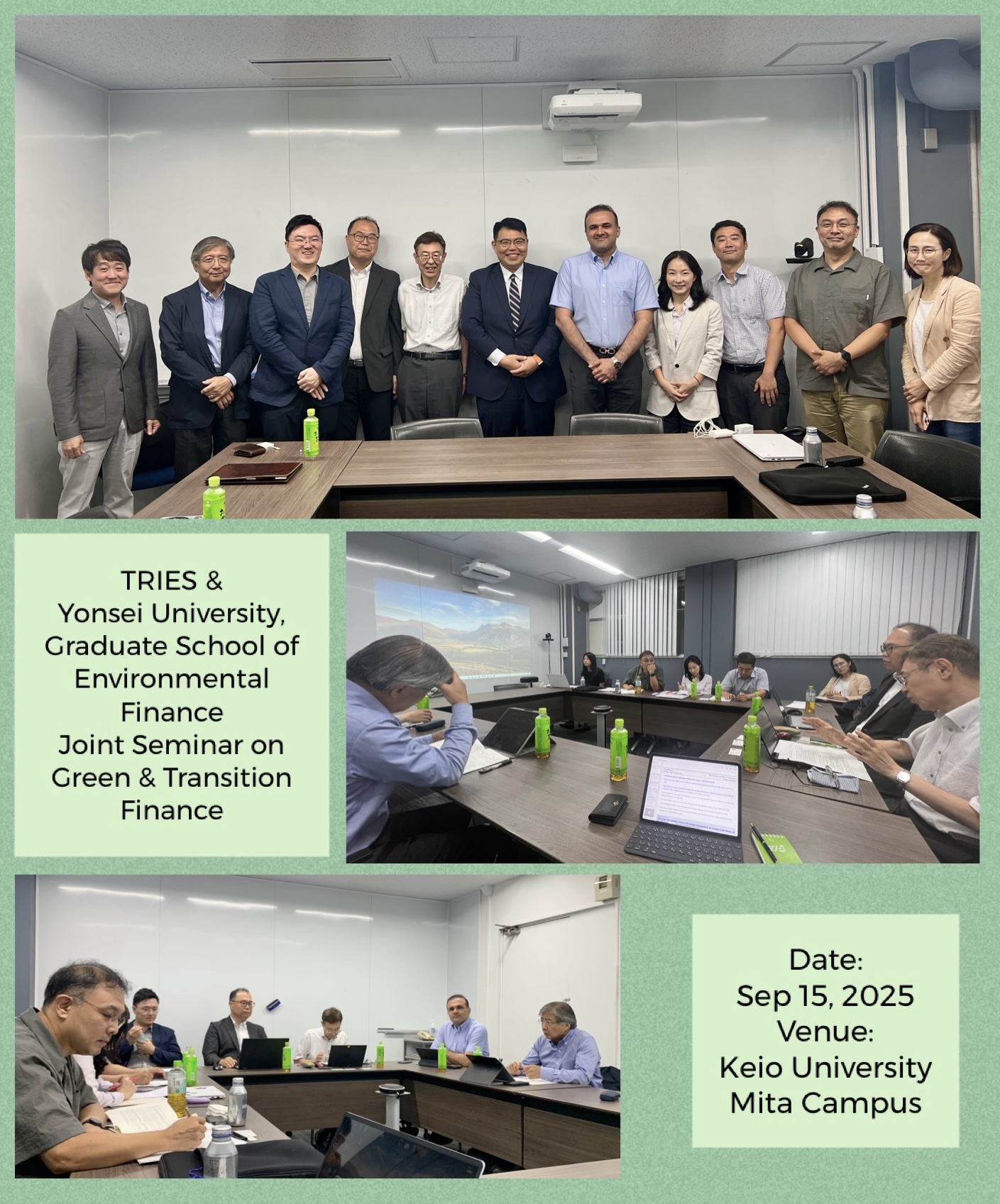
Tokai University and Chiang Mai University Sign MoU for Academic and Research Collaboration
Date: August 7, 2025On August 7, 2025, the Tokai University Research Institute for Environment and Sustainability (TRIES), Japan, and the Center for ASEAN Studies (CAS), International College of Digital Innovation, Chiang Mai University, Thailand, signed a Memorandum of Understanding (MoU) in an online ceremony.
The MoU aims to promote academic and research collaboration through joint studies, exchange of researchers, co-hosted seminars, and student study tours. It reflects the shared commitment of both institutions to advance knowledge on sustainability, environmental issues, and ASEAN regional studies.
Prof. Satoshi Honma, Acting Director of TRIES, and Assoc. Prof. Dr. Nisit Panthamit, Head of CAS, signed the agreement, which will remain effective for three years. This partnership marks a meaningful step toward strengthening ASEAN–Japan academic cooperation.
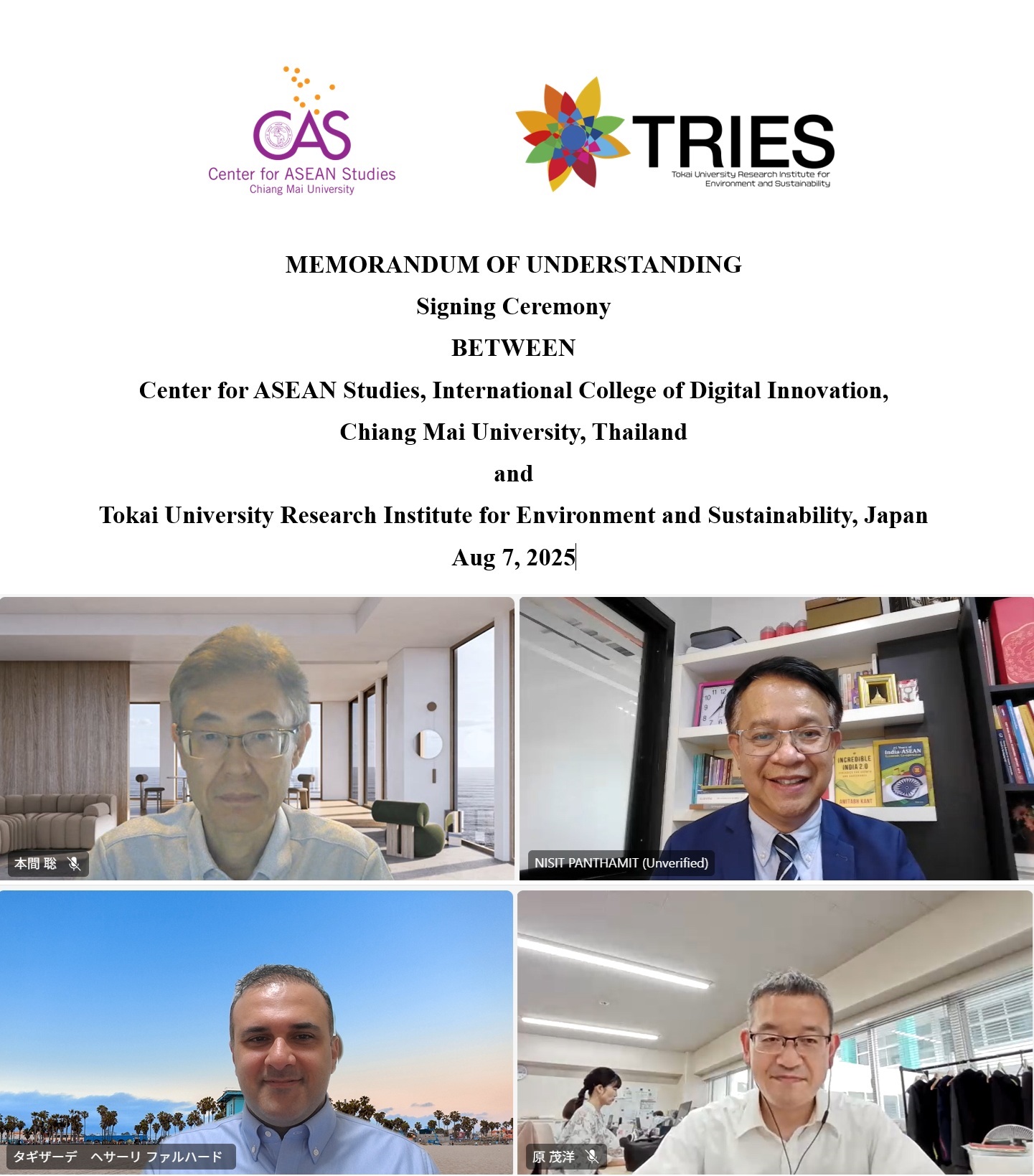
Dr. Farhad Taghizadeh-Hesary Received Commendation from the Minister of Foreign Affairs of Japan
Date: February 25, 2025Dr. Farhad Taghizadeh-Hesary of TRIES has been honored with the Commendation of the Minister of Foreign Affairs of Japan for his outstanding contributions to strengthening scientific and academic relations between Japan and Iran.
Each year, the Minister of Foreign Affairs of Japan recognizes individuals and organizations that have significantly contributed to fostering friendships, enhancing mutual understanding, and deepening cultural, scientific, and diplomatic ties between Japan and other nations. This year, 84 individuals and organizations were selected worldwide for this prestigious honor.
The commendation was officially conferred by H.E. Mr. Tamaki Tsukada, Ambassador of Japan to Iran, during a ceremony held at his residence in Tehran on Feb 25, 2025.
This recognition highlights Dr. Taghizadeh-Hesary’s significant role in advancing academic collaboration and scientific exchange between Japan and Iran.
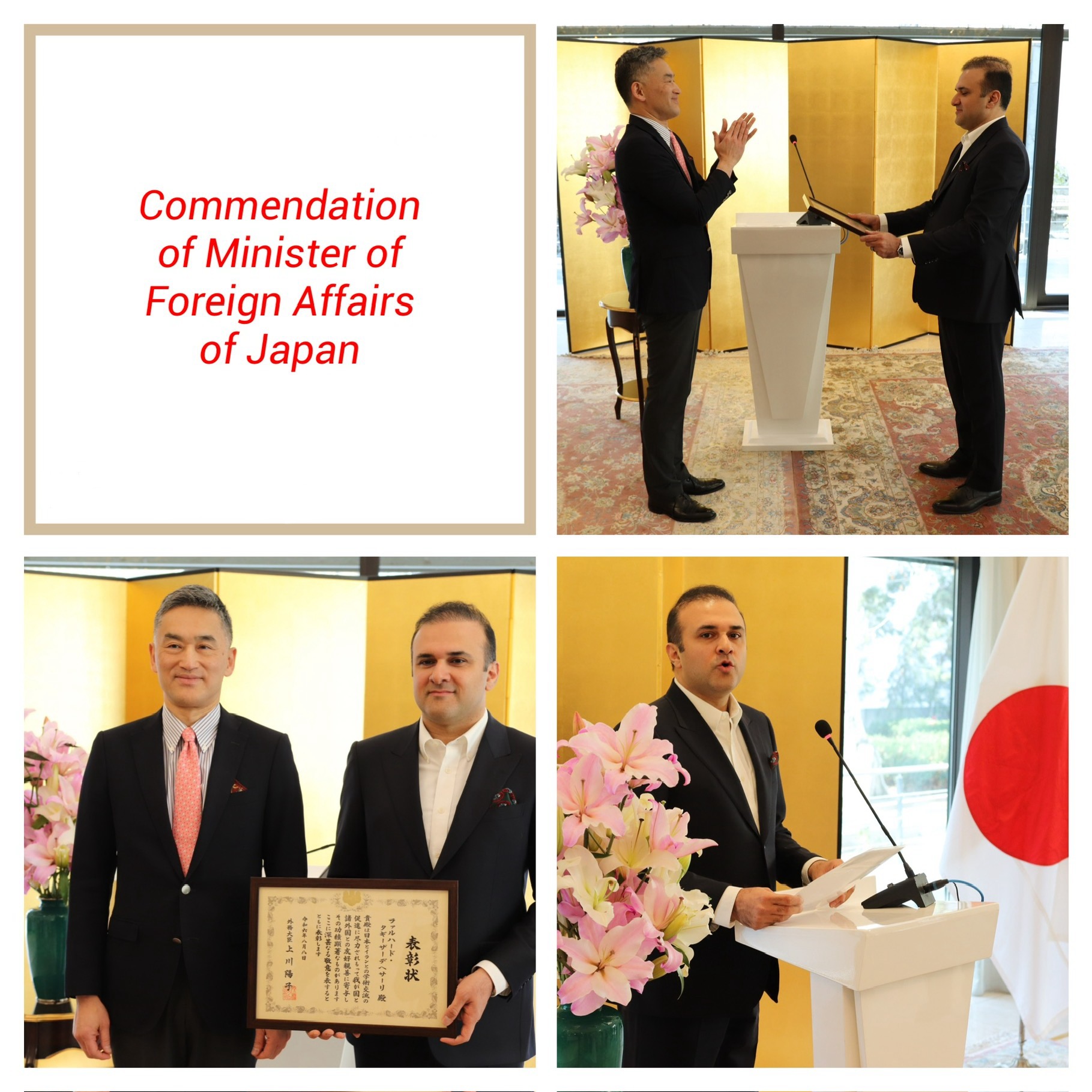
Green Growth and Sustainable Development: Insights from Asia Seminar
Date: February 25, 2025On Feb 25, 2025, Tokai University Research Institute for Environment and Sustainability and Kulliyyah of Economics and Management Sciences—International Islamic University Malaysia successfully hosted the seminar "Green Growth and Sustainable Development: Insights from Asia" and formalized the partnership by signing a Letter of Intent (LOI).
The seminar featured insightful presentations on Malaysia's environmental policy, the connection between finance, renewable energy, and economic growth in Asia, as well as the role of rare earth elements in Japan's green transition. These discussions shed light on the key challenges and opportunities in advancing sustainable development across the region.
This partnership paves the way for future joint research and academic collaboration between the two institutions.
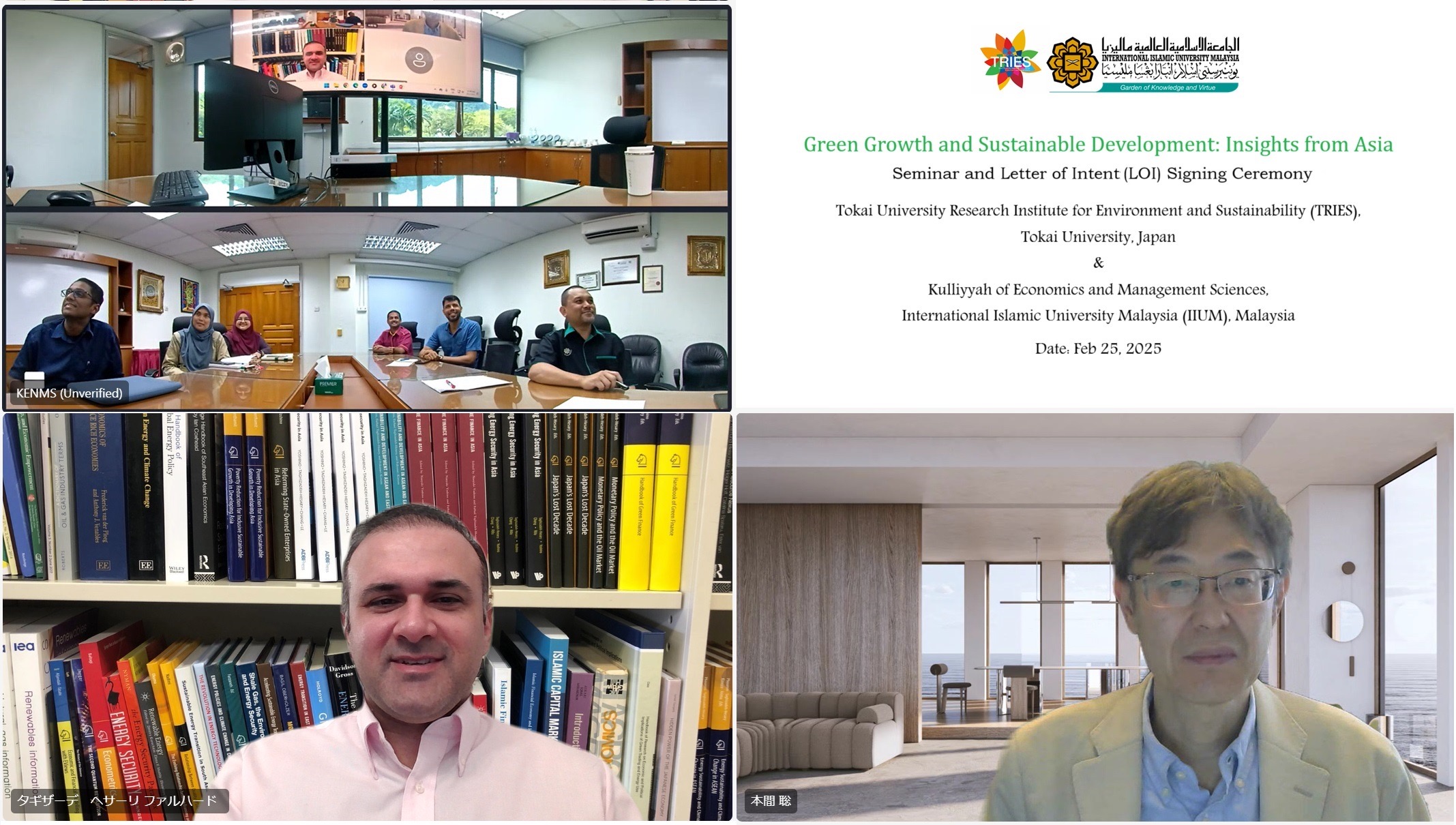
Green Finance and Sustainable Development" at the 2nd International Conference on Economics (ICE 2024) in Ho Chi Minh City, Vietnam
Date: June 8, 2024Dr. Farhad Taghizadeh-Hesary of TRIES delivered a keynote speech on "Green Finance and Sustainable Development" at the 2nd International Conference on Economics (ICE 2024) in Ho Chi Minh City, Vietnam, on June 8, 2024. The event was hosted by Ho Chi Minh City University of Industry and Trade, with Tokai University as one of the co-organizers.
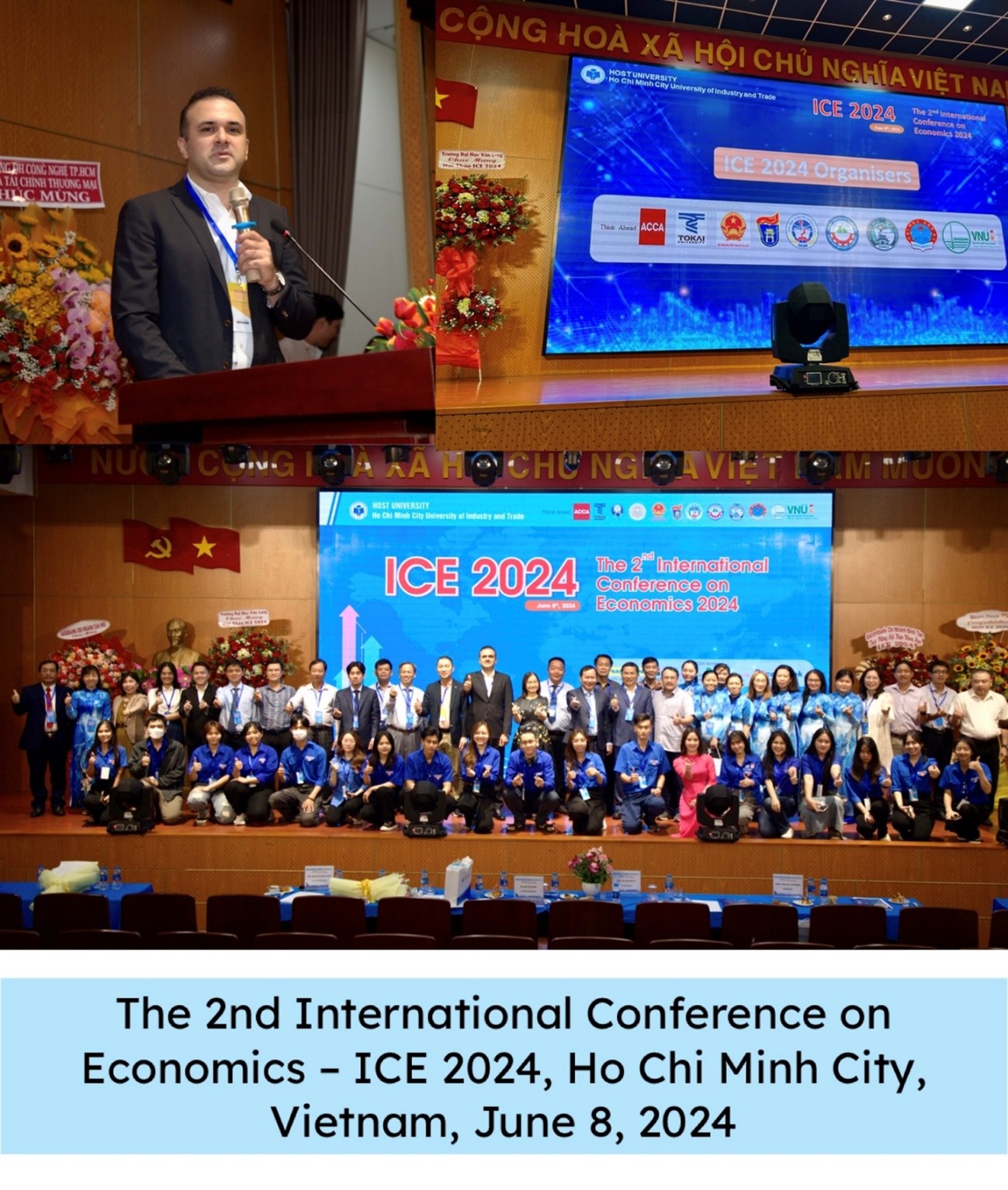
Economic Analysis Department of the National Assembly of the Republic of Korea
Date: March 6, 2024Dr. Farhad Taghizadeh-Hesary of TRIES was invited by the Economic Analysis Department of the National Assembly of the Republic of Korea, on March 6, 2024, to deliver a presentation on "Geothermal Power Development in Japan: Barriers and Remedies." which was based on his paper published in International Review of Economics & Finance . His insights highlighted the challenges facing geothermal expansion in Japan and the policy solutions needed to unlock its potential for sustainable energy.
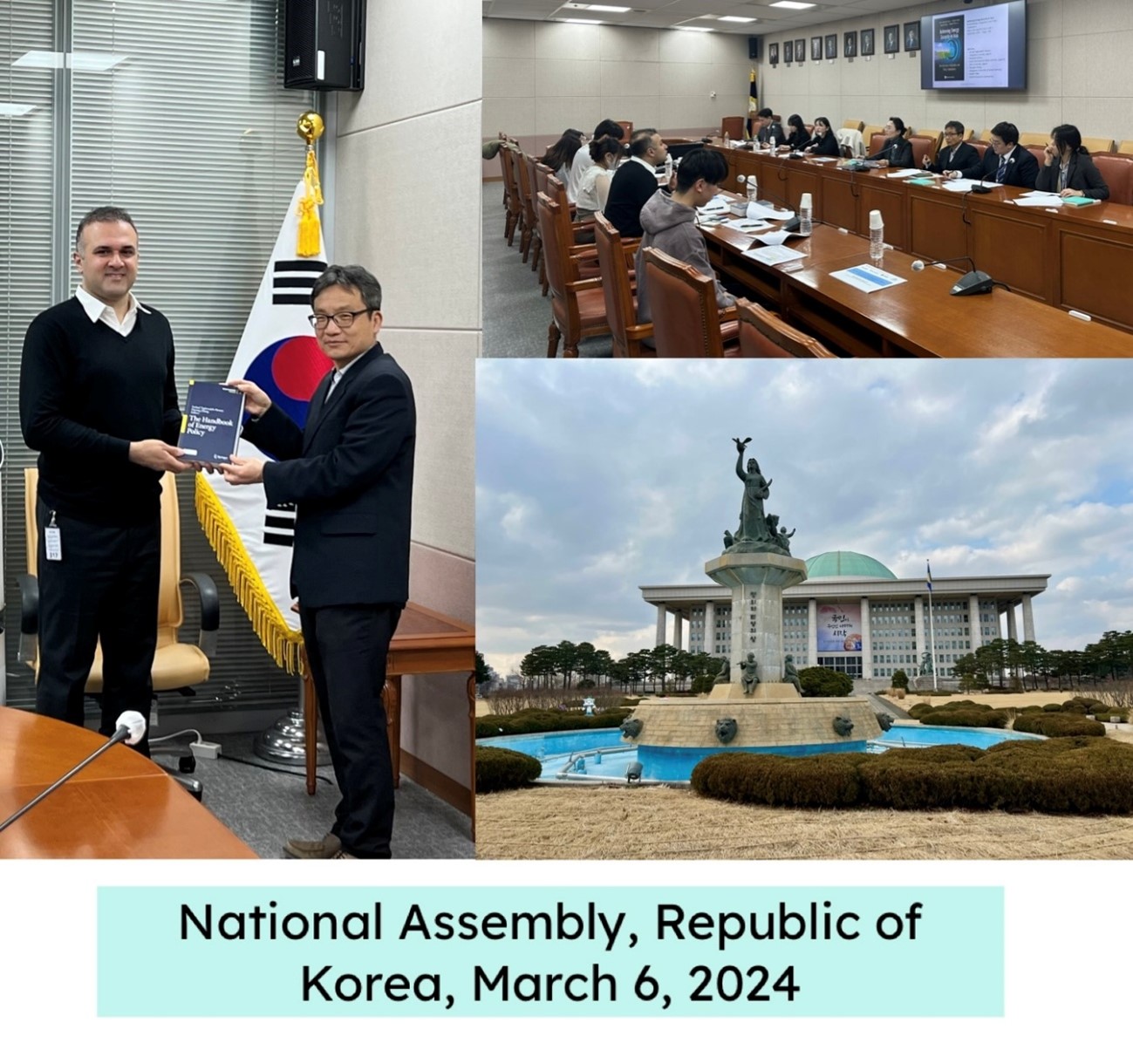
The Economic and Financial Policy Facilitation a Just Transition Conference
Date: Nov. 15 to 17, 2024Venue: Zhejiang University, Shaoxing, Zhejiang Province, China
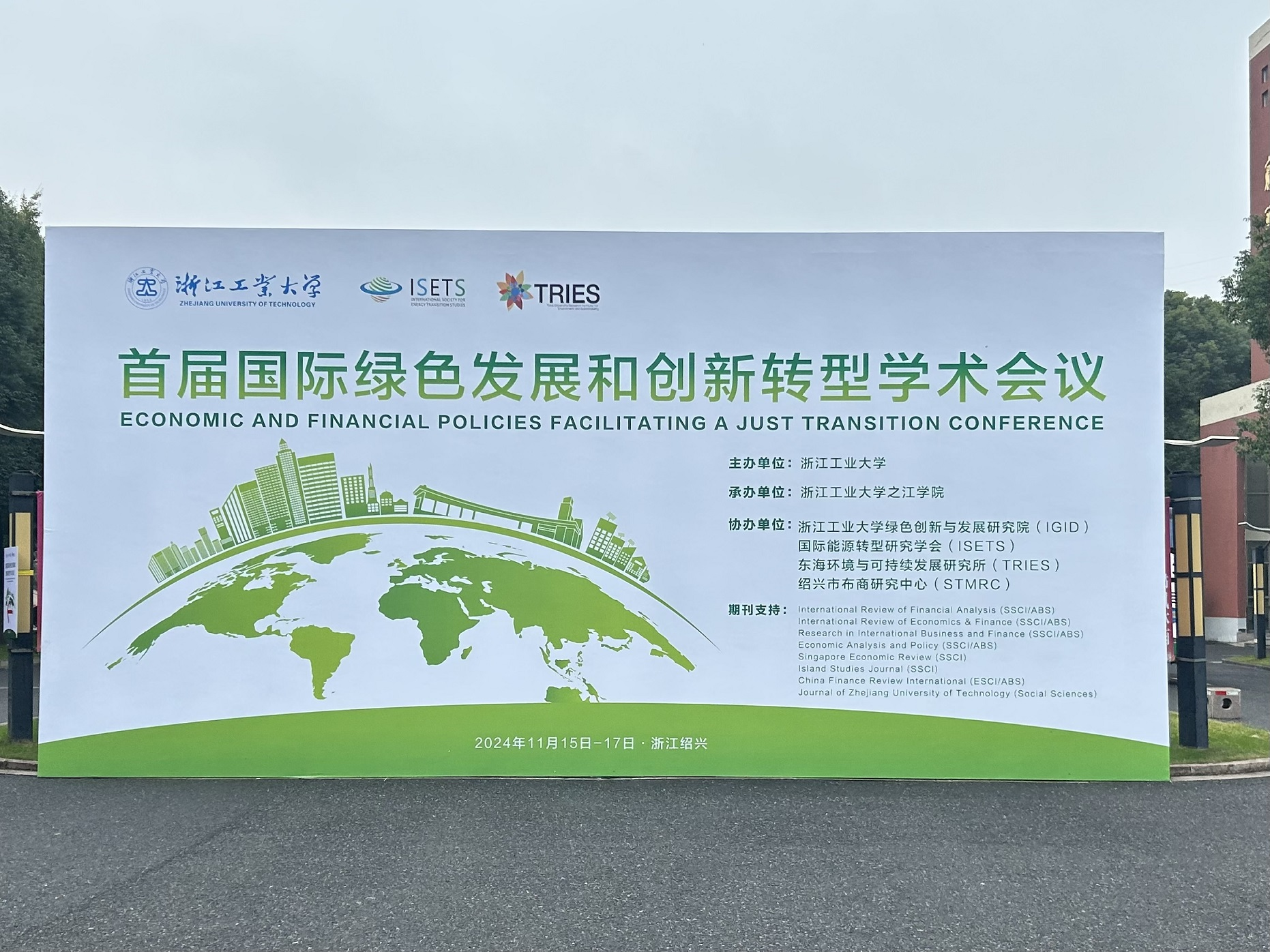
The Economic and Financial Policy Facilitation a Just Transition conference was successfully held from November 15 to 17, 2024, in Shaoxing, Zhejiang Province, China. Organized by the Zhejiang University of Technology with the co-organization of the International Society for Energy Transition Studies (ISETS), and the Tokai University Research Institute for Environment and Sustainability (TRIES), the event brought together researchers, policymakers, and industry leaders to address one of the most pressing issues of our time—ensuring a just transition to a sustainable future. The conference featured a dozen thought-provoking papers and dynamic panel discussions, all centered around the critical role of economic and financial policies in facilitating a just transition. Topics included innovative financing mechanisms, strategies for supporting vulnerable communities, and policy frameworks to balance economic growth with sustainability goals. A just transition aims to ensure that the shift to a low-carbon economy is fair and inclusive, leaving no one behind. Economic and financial policies play a pivotal role in achieving this.

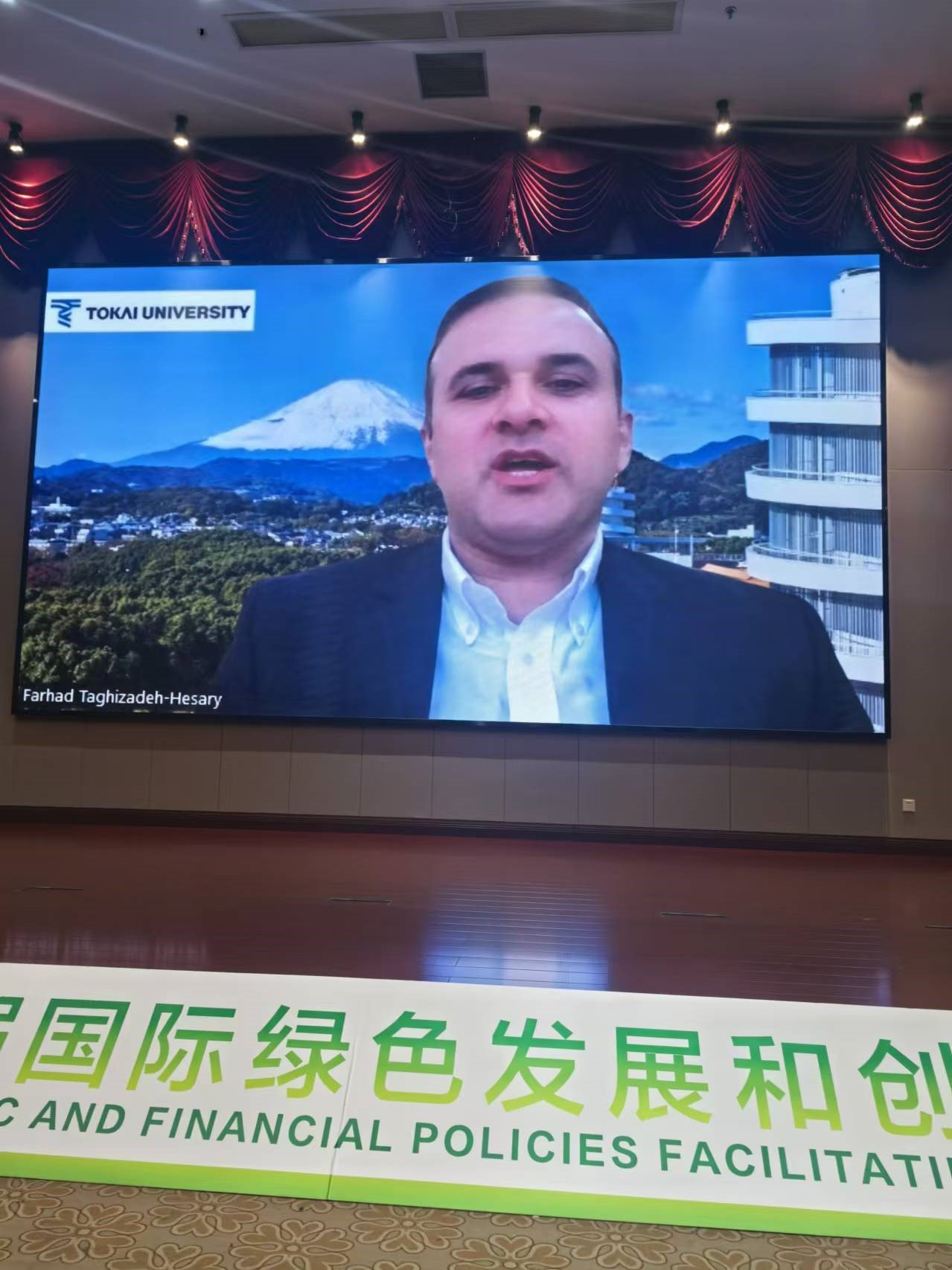
Financial Drivers of Sustainability & Carbon Reduction
Date: Oct 10, 2024Venue: Tokai University, Tokyo, Japan
Progam: Available from here.
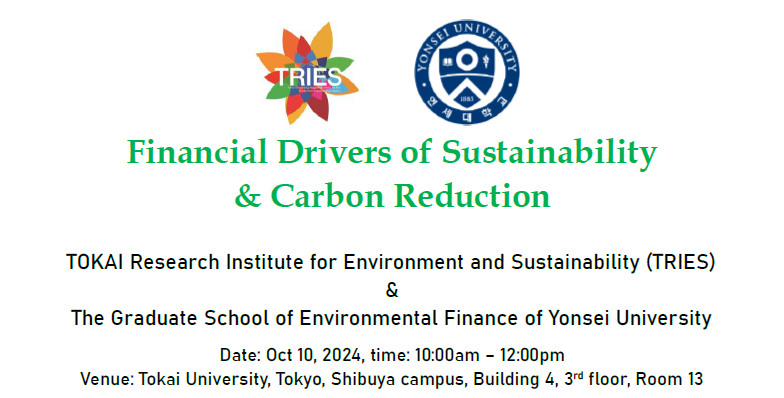
Following the MOU signed in 2023 between TRIES and Yonsei University Graduate School of Environmental Finance, a seminar titled "Financial Drivers of Sustainability & Carbon Reduction", was successfully co-hosted by the two institutions at Tokai University's Shibuya campus on Oct 10, 2024. The event opened with welcoming remarks from Prof. Kiyoshi Yamada and Prof. Satoshi Honma, followed by opening remarks from Prof. Suk Hyun. The keynote by Prof. Naoyuki Yoshino, titled "Diversified ESG Evaluation by Rating Agencies and Net Carbon Tax to Regain Optimal Portfolio Allocation", addressed key issues around ESG evaluations and carbon taxation.
We then had five presentations:
• Prof. Byoung-Ok Song on "The Optimal Required Rate of Carbon Reduction and Optimal Discount Factor under Backward Proof Regulation",
• Prof. Satoshi Honma on "Does Financial Development Increase Renewable Energy in Asia?",
• Prof. Suk Hyun on "Exploring the Impact of Information Environment on ESG Disclosure Behavior: Evidence from National Pensions and Foreign Investors in Korea",
• Assoc. Prof. Farhad Taghizadeh-Hesary on "Role of Critical Minerals in Achieving Green Economic Growth in Japan",
• Dr. Bong-Seop Kim on "Exploring the Financial Determinants of GHG Emissions: Insights from Listed Companies in South Korea".
The event concluded with a Q&A session and engaging discussions.
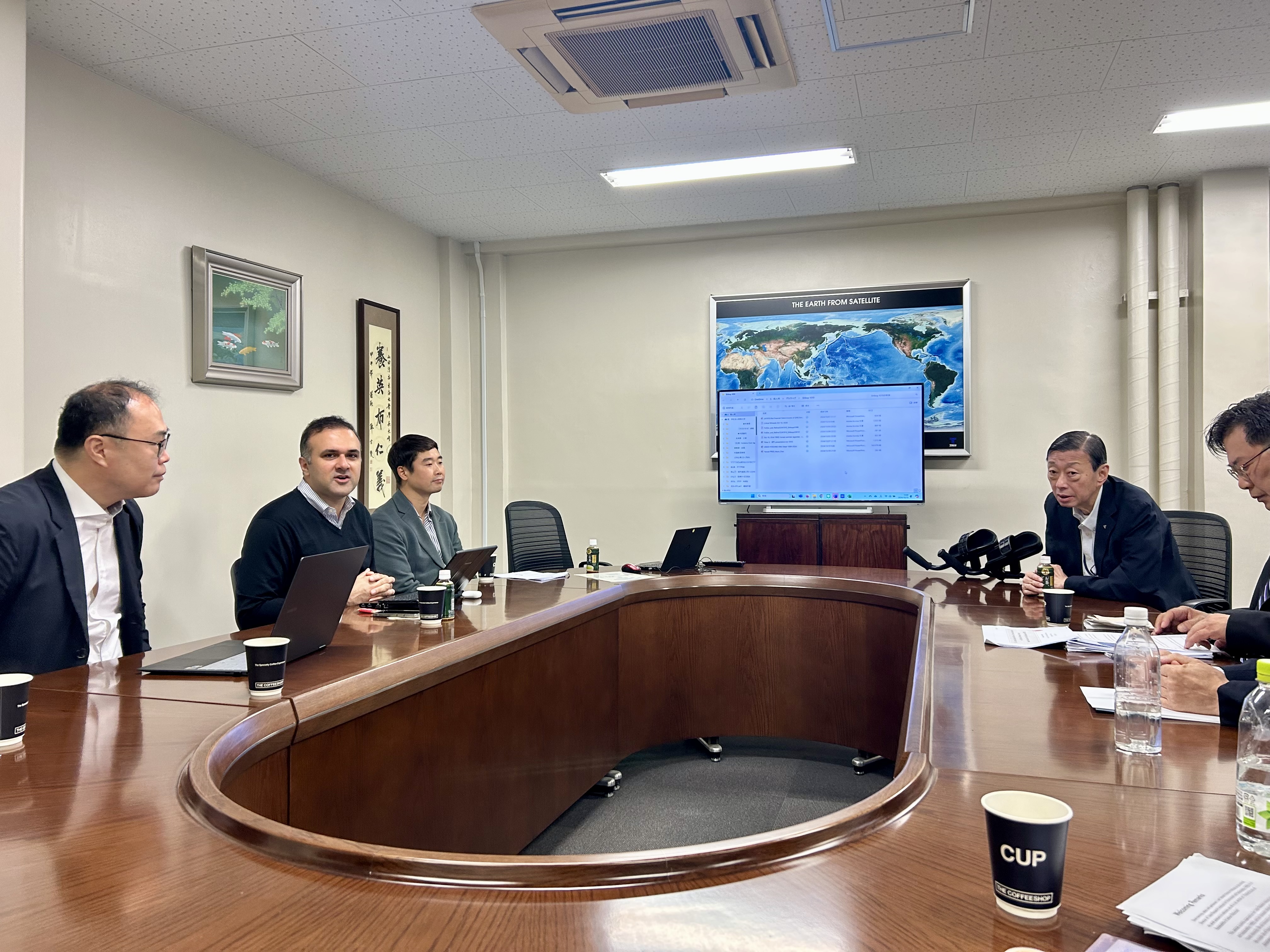
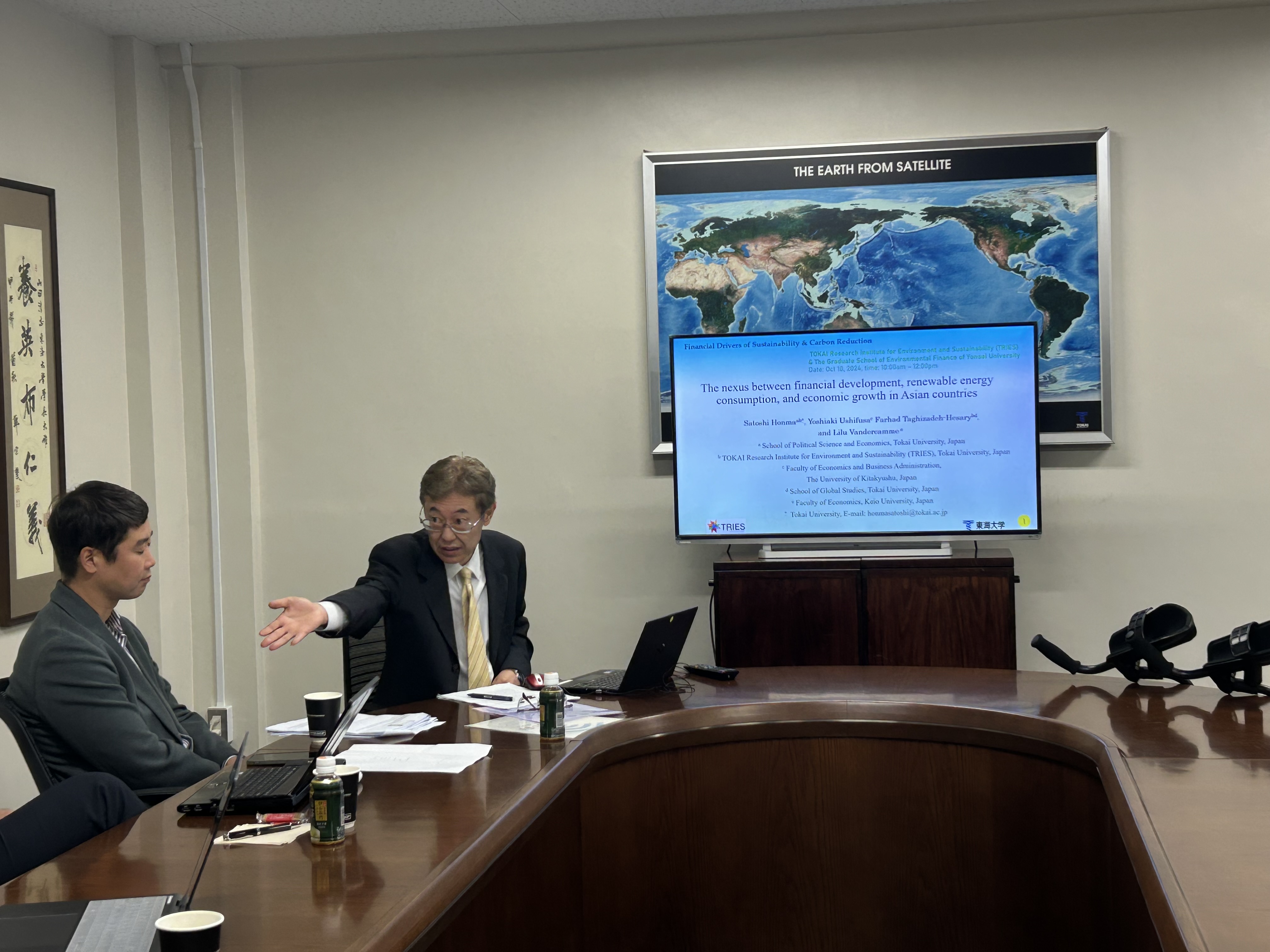
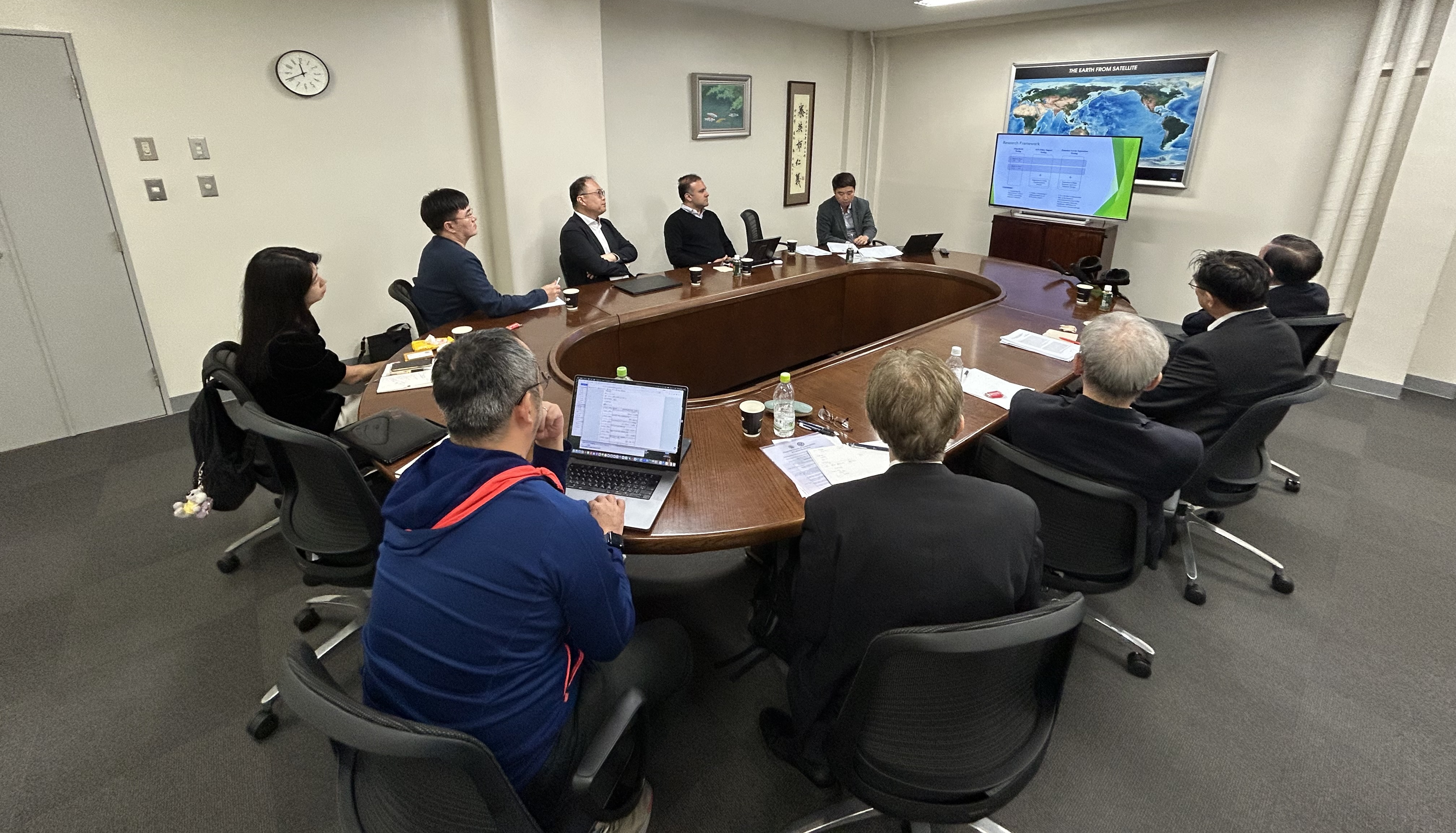
Religion and Sustainable Development - Emerging Challenges and Opportunities Ahead of the 2024 G20 Summit in Brazil
Date: Saturday, January 20, 2024Venue: Tokai University Shinagawa Campus
Program: Available from here.
Sustainable Solutions for Meeting the Carbon Neutrality Goals
Date: Friday, Nov 24, 2023Venue: Tokai University Shibuya Campus, and ZOOM
Program: Available from here.
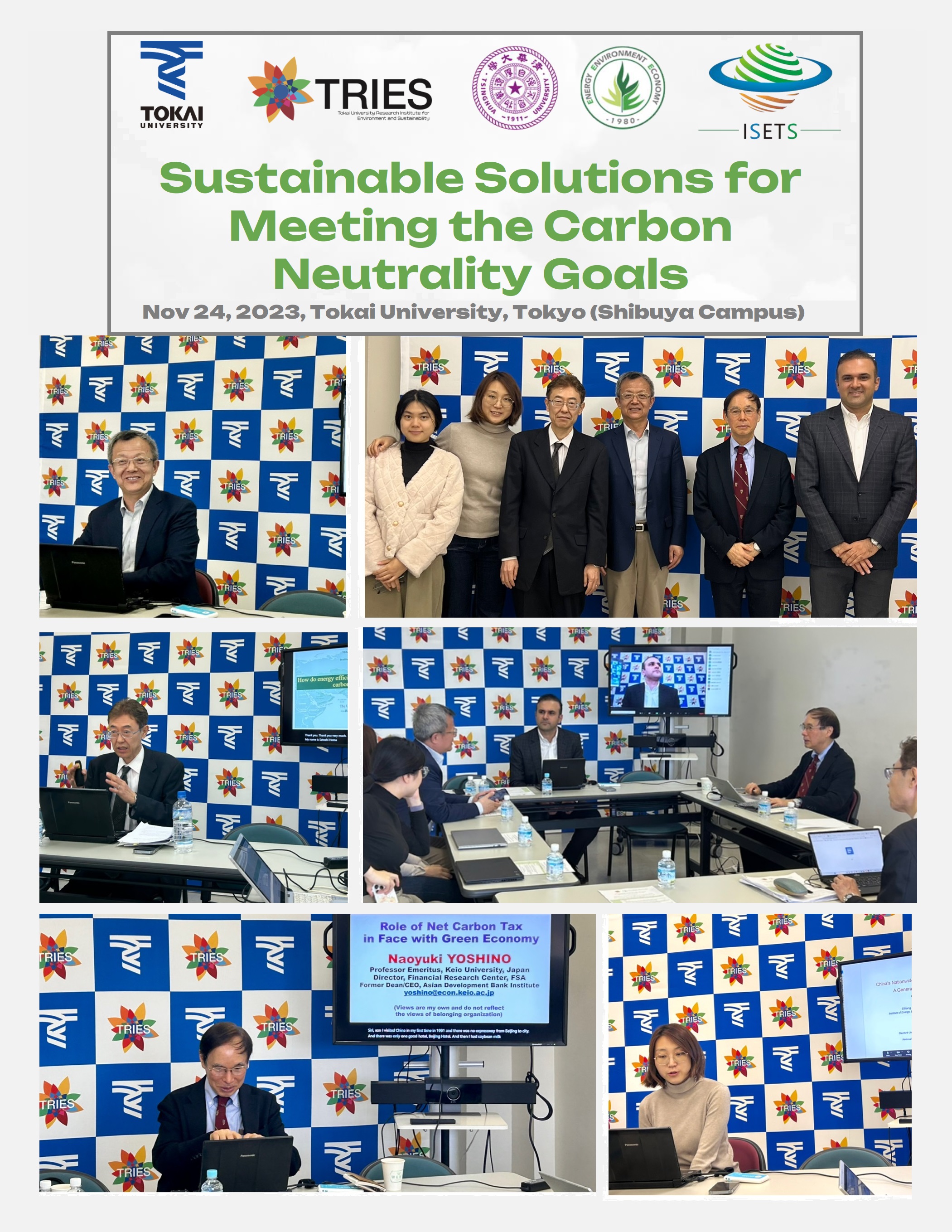
Energy, Climate Finance, and Policy Analysis seminar & The Handbook of Energy Policy launch
Date: July 6, 2023Venue: Tokai University, Shonan campus & Zoom platform (hybrid)
Progam: Available from here.
ESG Investments in East and Southeast Asia
Date: May 12, 2023Venue: Kitakyushu International Conference Center & Zoom platform (hybrid)
Progam: Available from here.
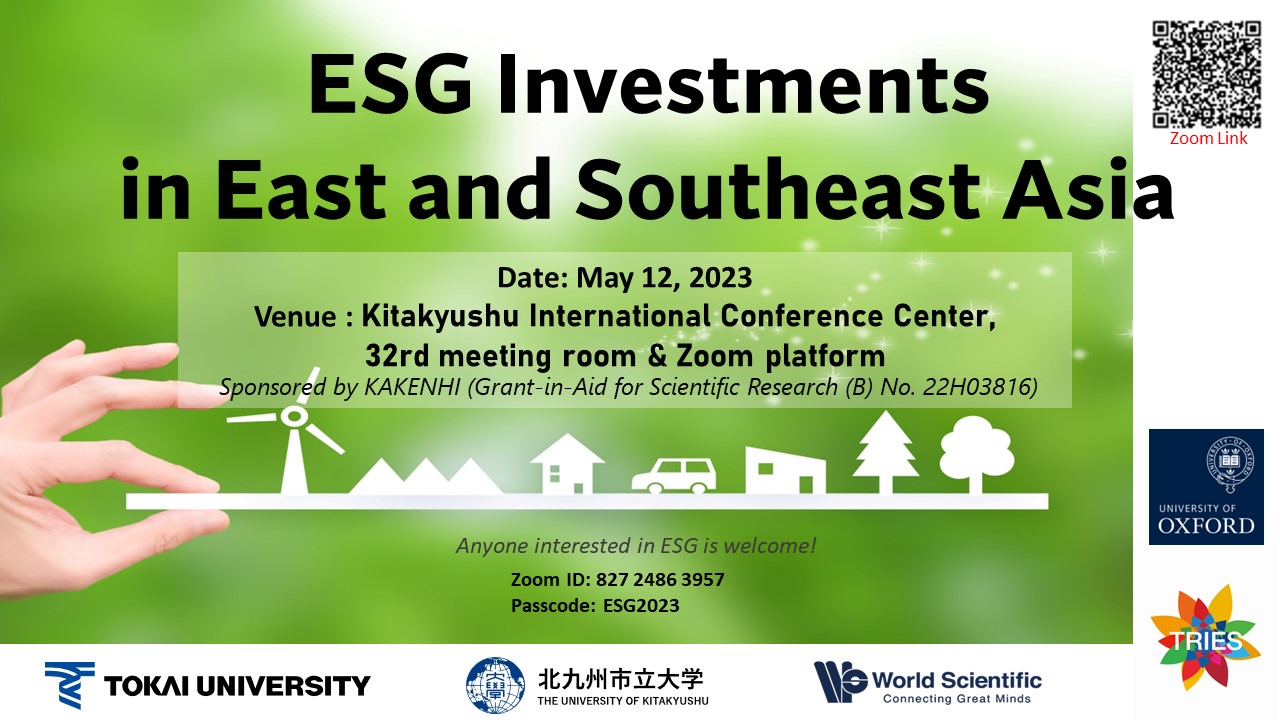
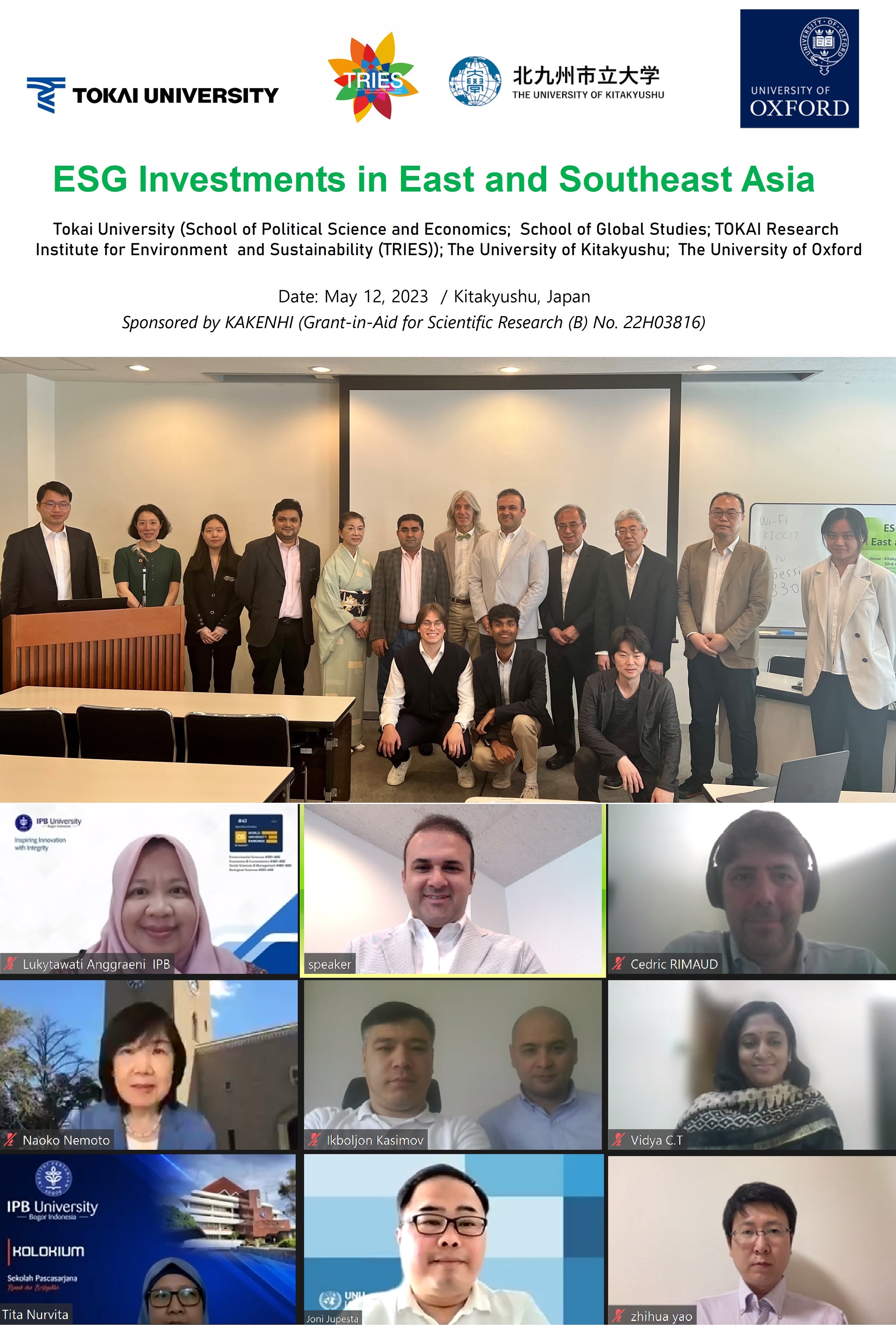
Tokyo Energy Transition Forum & The 5th ISETS Energy Transition Forum
Date: Oct 14, 2022Venue: Tokai University, Tokyo, Japan
Progam: Available from here. (Biography of the speakers).
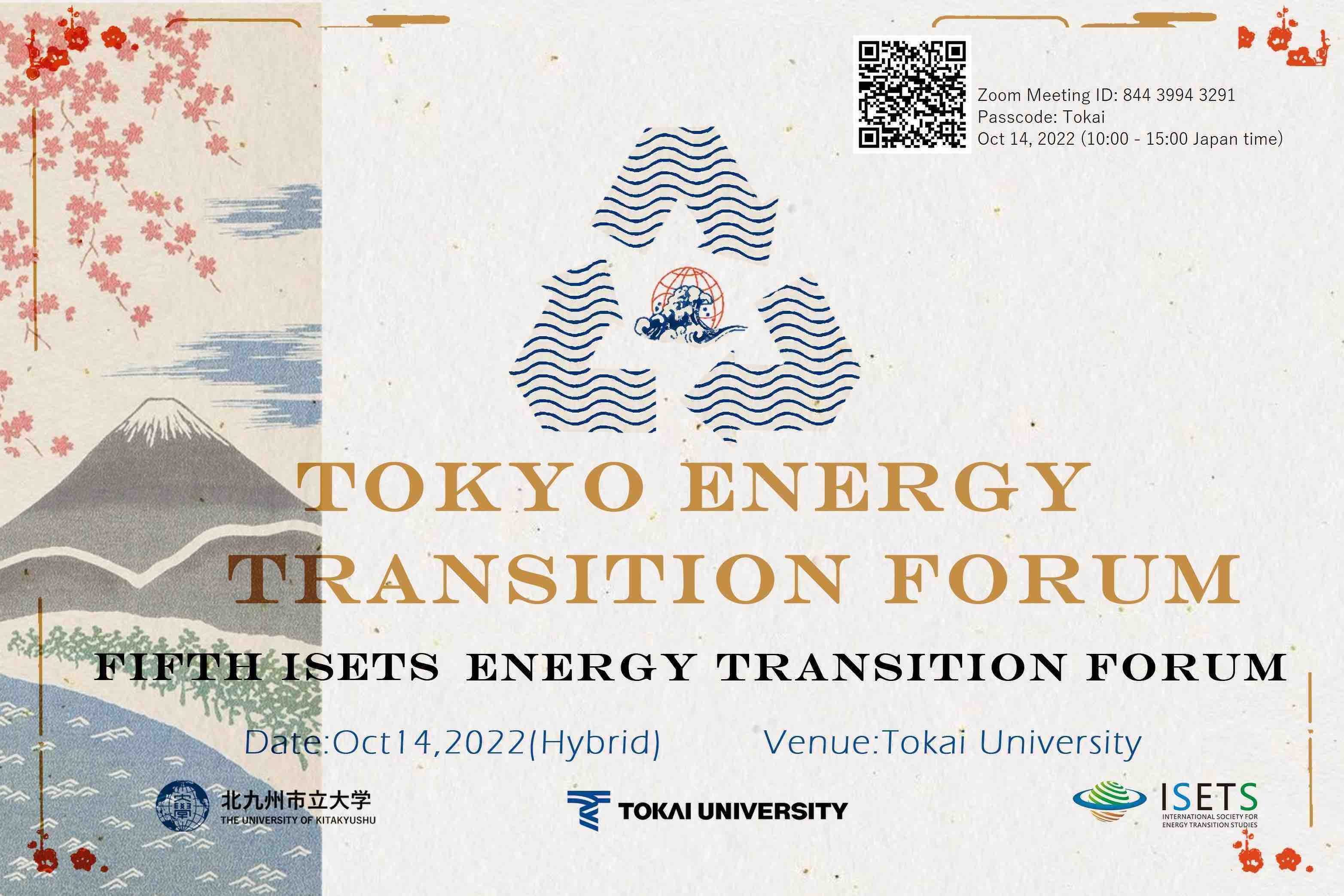
With the Fukushima nuclear disaster in March 2011 and the shutdown of all nuclear power plants, Japan's energy self-sufficiency and energy security deteriorated drastically. Japan substituted the nuclear loss by importing more coal, LNG, and oil. However, with the most recent oil price increase and the supply disruptions due to the Ukraine war and the global energy crisis, and because of the carbon neutrality goals set by the Japanese government, the country has ambitious plans for the energy transition and increasing the reliance on domestic renewable energy resources.
Based on the energy transition strategies set by the Japanese government, while the share of nuclear energy is set to increase, the country plans to increase the share of renewable energy in power generation from 18% in 2019 to about 38% in 2030. This implies a massive investment in renewable energy, especially in the solar sector. According to the plan, coal consumption will be reduced from 26% to 19%. On the other hand, Japan plans to achieve a hydrogen society in the long-term, although currently, it represents only 1% of the energy demand; The country aims to reach 10% by 2050.
With this background, Tokyo Energy Transition Forum and the 5th ISETS Energy Transition Forum planned to bring distinguished experts from Japan, Australia, Singapore, Sweden, and India to discuss ways to foster the energy transition and achieve a carbon neutrality society. The forum will be jointly organized by The Tokai University (School of Political Science and Economics; School of Global Studies; TOKAI Research Institute for Environment and Sustainability (TRIES)); The University of Kitakyushu; The International Society for Energy Transition Studies (ISETS) on Oct 14, 2022, at Tokai University in Tokyo and on the ZOOM platform.
The summary of th Forum is available here.
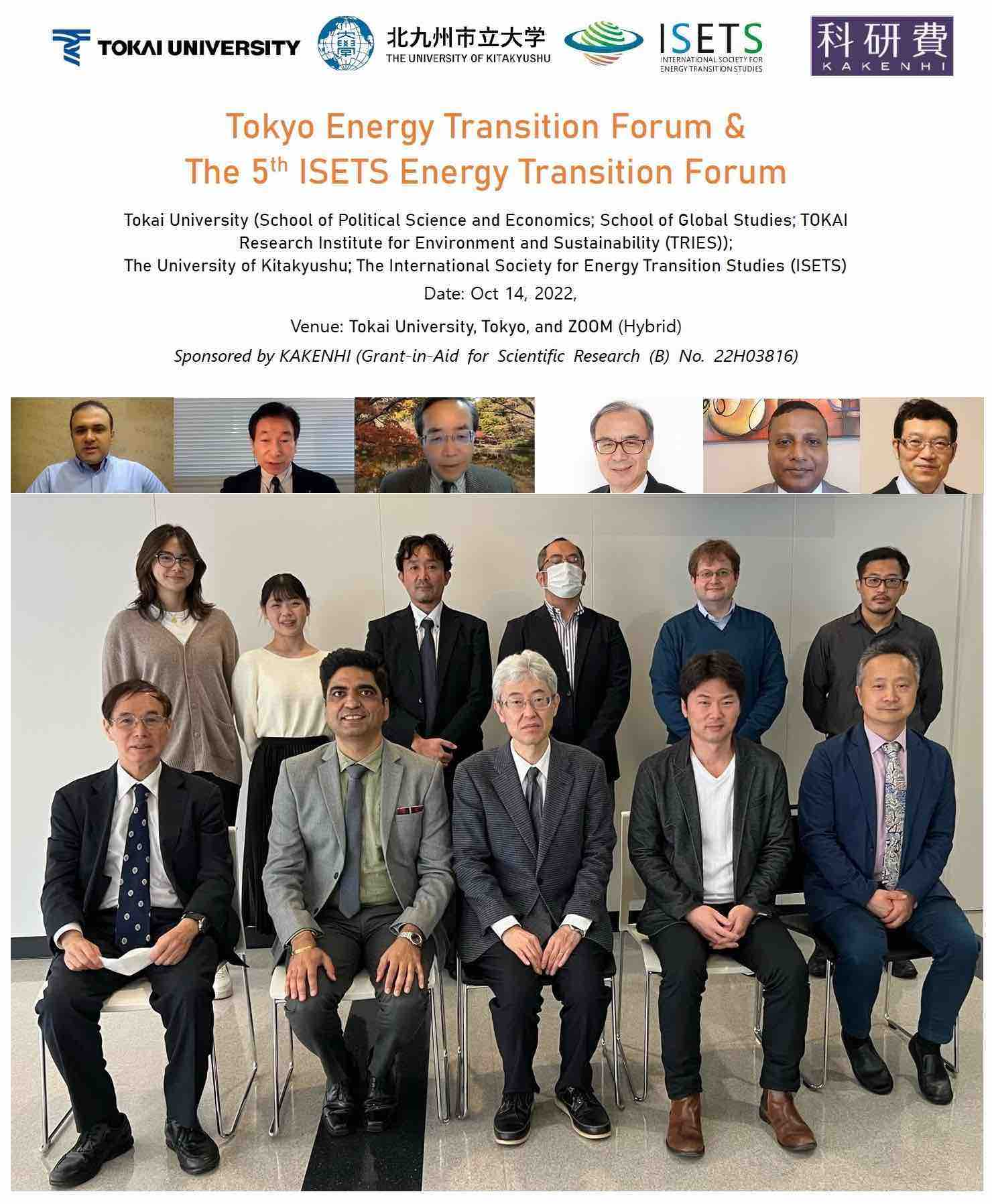
Other Resources
Memorandum of Understanding Signing Ceremony between Tokai Research Institute for Environment and Sustainability (TRIES) and The Graduate School of Environmental Finance of Yonsei University
TRIES and the Graduate School of Environmental Finance of Yonsei University signed a Memorandum of Understanding (MOU) on October 4, 2023 to further promote research cooperation.
